#piquancy and phantasm
Note
I really enjoy Piquancy & Phantasm by BD_Z and GhostlyHauntings on Ao3, cartoon verse. It feels like an old gothic novel. The characters are written in a way that fits the tone. The suspense is so well paced, with a slow build up to an actually satisfying conclusion. And the illustrations are even better. It's a personal favorite of mine.
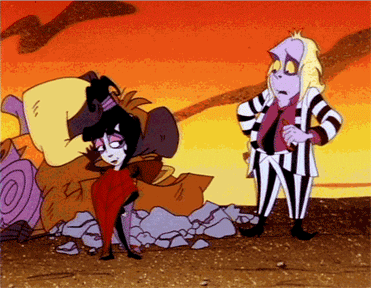
Anonymously tell me your favorite Beetlejuice fanfic
#fanfic recommendation#ao3#beetlejuice#lydia deetz#betelgeuse#beetlebabes#piquancy and phantasm#bd-z#ghostly hauntings#venture someplace scary
15 notes
·
View notes
Text
Phantom of the Opera Wine List

Your wine sommeliers:
@meilas: Concept, Graphics, Layout, Project Manager, Hadley, Barbara the Mannequin
@gwalchmedi: Franc D’Ambrosio, Norm Lewis, Drew Sarich, Peter Joback, Bronson Norris Murphy, Hugh Panaro, Michael Crawford, Jonathan Roxmouth, Jeremy Stolle, Barbara the Mannequin, Ethan Freeman, Peter Karrie, Dmitry Ermak, Earl Carpenter
inspired by @mxbuster: Uwe Kroger
inspired by @petittneko: Saulo Vasconcelos, Thiago Arancam
@devilswalkingstick: Cooper and triptychs
@when-it-rains-it-snows: Ben Lewis
DocTy: Alexander Goebel
Tina: Gina Beck
@from-aldebaran: Derrick Davis and proof-reader
@therosenpants: proof-reader and taste-tester
@box5intern: Christopher Carl

This wine list could not have turned out so well without the loving dedication of everyone involved. Thank you everyone for putting up with this silly project for so long!
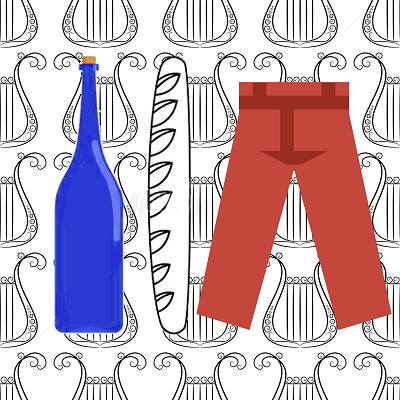
D’Ambrosio Vintage
Vintage 1962, best run 1998
Other nicknames: Cabernet Franc; Franc D’Amn that’s good!
Slither yourself down somewhere comfortable and loosen a few buttons while you steal a taste, slowly swirling your tongue around a luscious mouthful of this full-bodied, ambrosial red. Every note stays with you while you are distracted by its elegant looks, get reeled in by a silvery touch, and feel it gliding along your throat. As you swallow, a slow leisurely piquancy reveals a muscular body and delivers a prominent, long, full finish. A total god of a wine. Keeps giving satisfaction long after you have embraced your last glassful.
Bottling notes: The reddest of red wines in the bluest of containers, and the perfect precursor to pants-less pastimes. Comes in our most prominent bottle.
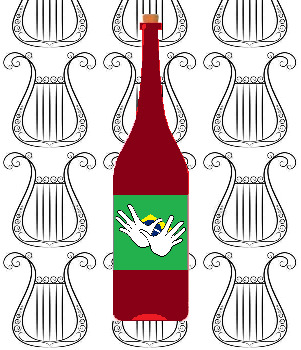
Saulo Vasconcelos, vintage 1999
An epic year for Brazilian wines, this timeless choice has performed in many a fine vintage bottle. A few tastings will assure you that this wine leaves you anything but Miserable, being a bit of a beast in disguise. Delightfully playful, sensuously hands-on with its flavour, and encasing you in its warm, chocolate tones, you’ll find yourself helplessly succumbing to its embrace. A proper, stern Daddy of a wine, this is one for those who like their types mature and commanding. De Nada!
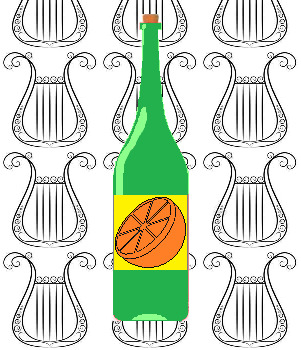
Crémant NormLew Château Tallahassee
A first for a Crémant from this region of Florida, you’ll be getting a plethora of orchard fruits here with delightful baritone notes! Up there with the finest of champagnes, just enjoy how this Crémant gives such a unique expression of its appellation.
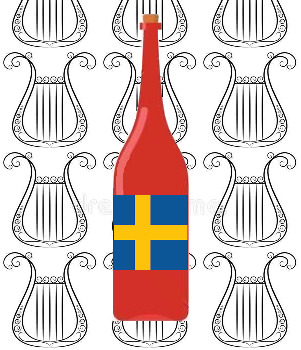
Peter Jöback
This fiery Scandinavian grape is a notoriously difficult one to grow well, but prolific once it takes hold, which makes this lovely drop of sleek Swedish red even more impressive! The acidity has a true, tenor register, a light note that is just right for pairings with other Swedish delicacies, I'd say. Very quaffable indeed.
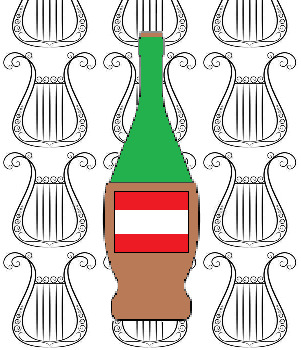
Drew Sarich
With a very young feel to this Veltliner grape, it actually delivers a surprise that is a decade ahead of itself. This wine has a long taste on the tongue, sitting there like a kitten purring in your lap. Delightfully complex, this is a New York socialite of a vintage with a phantasm of aromatic perfume on it which is absolutely phenomenal. It’s fascinating how the acidity is so high that it somewhat devilishly disguises the wine’s natural sweetness.

Dreamclimber from the House of Derrick Davis
Two pressings, 2016-2017 and 2019-2020
An astonishingly underappreciated vintage, Dreamclimber will make you abandon your defenses from the very first sip. A potent mix of smooth deep notes of dark oak ranging upward to a soaring sunshiney sweetness, the positive energy in every bottle offers sweet intoxication and will fundamentally alter your outlook on life. The dynamic and passionate essence of Dreamclimber elevates everything around it, so if you need to restage a meal, add this bold and muscular yet soft and sensual wine to your table. Want to stay one step ahead of the crowd? Catch a Broadway-bound dream of a wine and you can say you were among the first to realize its genuine and soul-stirring star power. Dreamclimber has the uplifting soulfulness to take you and your guests to where you long to be!

Bronson Norris Murphy
Variety: Babygrapes
The very youngest of our vintages, this wine has brought out excitingly different comments from our patrons. Respected Voices talk knowledgeably either about its Wheel of Flavours, or enjoy a genuine Laugh about how this rush of taste almost knocks them over; still others amongst the cognoscenti talk about its delightfully Icie youthfulness and endearing features, or how a glassful taken at bedtime would counter a Snowy cold evening. One Purist anonymously chuckled that a grape as vigorous as this could be put in more than one setting and still retain its delightful, child-like boyish charms. Two stunningly dressed patrons, in Rose and Cora(l), admitted they’d been given a taste of this wine secretly, a sort of cameo appearance before its launch, and had felt the vibes of the overt rosehip and petal flavours long before it had become popular. The pair’s general consensus was that this vintage was young enough to Make It on the scene, although the coquettish undertones about vinicultural size and handspan were elusively enticing. The Vast Glassy Orangery was agog with gossip about some Baguette-wielding youth (and their noteworthy tailoring) having hugely overdosed on the tasting previously, almost knocking their socks off with its pale beauty and fragrant scents. Their partner in crime, a clear Persephone of a beauty, was wearing delicious couture from the House of ChristineGrrl, and the effect of this duo almost matched the effect of the wine’s heady aroma on the delightfully younger crowd. Suffice to say the vintage was a resounding success and its aura of vinicultural adolescence bursting into manhood held everyone in its attractive grasp. One worth keeping.
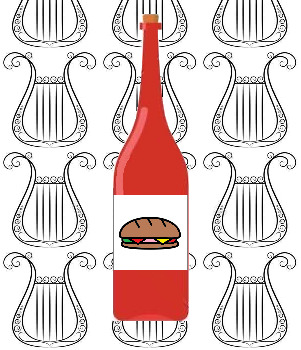
Panaro Prosecco
The elevation that every note in this charismatic, versatile Prosecco provides ensures that the bubbles in this Panaro Prosecco are so much lighter than in the flatter and usually insipid Chagny Champagnes to which they are unfairly compared. For me, there is no contest; crystal clear delivery, in a bottle with movie star good looks, this vintage delivers a deliciously singing bouquet, with beautifully crisp notes of apple to finish.
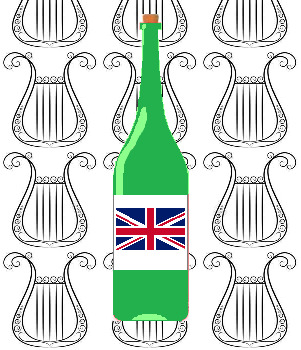
Michael Crawford, vintage 1986
Oh yes, this most venerable of English sparkling wines has a well-rounded palate with a hint of the most delicate, sweetest of orchard fruits giving way to deeper notes of Parisian brioche, with a hint of French kisses. French, I hear you ask - but did you know that English winemakers use the same traditional method that the French use to produce Champagne?
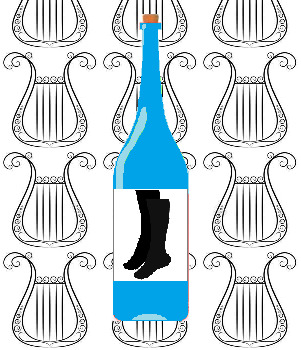
Jonathan Roxmouth, vintage b.1987, run 2011-2012, 2019
Not an easy Chenin Blanc grape variety to like on first encounter, this South African powerhouse has a drawn-out tingle which stays on your tongue, and wanders high into your head. The yearning feel to break out in full fruit mode is hidden beneath the complex mix of earthy, graveyard depths. You may feel the emotional and smoky hint of stalk, but a flash of strength beneath its velvet glove packs a punch like no other. Rox your Sox.

The St(r)olle
The smoothest of our wines, this will simultaneously quench your thirst and leave you begging for more. In parts of America, this vintage used to be obscure, yet when you taste it, you’ll wonder why. This wine takes a confident, sassy stroll across your palate, its taste coiling a lasso around you as rock solid as Henry Cavill’s abs. Achingly rich and smooth, sporting lush, sweet toned, deep throated berry notes tinged with vanilla, it has suave yet elemental flavors pushing out from a deep, muscular centre. One not to be trifled with.
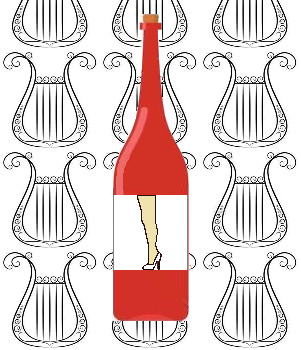
Barbara the Mannequin, vintage 1988
Wooden and oaky, this wine is perfect for poorly-thought-out proposals. We’ve all known at least one weird, dorky guy who somehow engineered a vision of a hot chick. This wine is that chick. Barbara is also known for its thin, acid nature, bolstered with a dressing that feels domineering, but sadly is only a foreshadowing of a disappointingly textured mouthfeel, with little middle, and an abrupt finish.
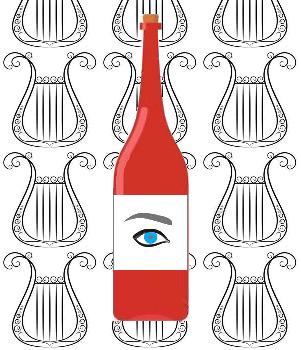
Hadley Fraser, vintage: 2 weeks old
A light dessert wine that sometimes forgets how it is supposed to taste. It’s not its fault. Really. We just didn’t give it enough time before bottling it.

Alexander Goebel
Der Goebel Veltliner - Vintage 1988
Often overlooked and replaced by the Freeman, its direct descendant, the Goebel is the true original flavour of Vienna's best vineyards, planted and cultivated by the same London vintners that originated the Crawford. Since 1988 the deep rich tones of Dunkelheit in this wine have melted the heart and palate of real connoisseurs around the globe, who also appreciate the high Skan-da-lös and Maskenball notes that follow the first taste. Best served in the Original Cast environment (especially accompanied with a side dish of Nistler and Pfeifer) to highlight its most recognizable qualities, it is also recommended in its "boot" version where its taste is sublimated by visual experience to heighten each sensation.
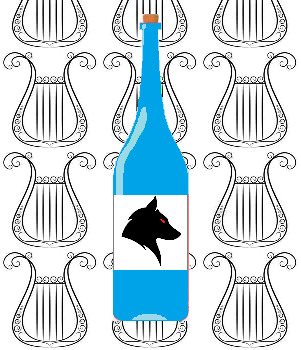
Peter Karrie
Vintage with a distinctive voice. A commanding flavour, this is a wine both dangerous and elegant, one a chivalrous soul would offer to another, with a heart-rending tone, and an unparalleled physicality and wealth of detail. This grape makes the wine totally in a class of its own, with a wandering taste yet, by some rare and strange alchemy, with a touch of the rock band too. A bit of The Wolf in this bottle.
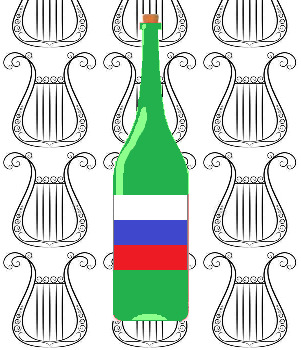
Ermak Syrah
Our only Slavic wine to date. Once phans sneak a taste of Ermak, they become avid for this imposing Russian grape. Its notes are powerful and bright, dominated by scents of ripe rich raspberry, and a touch of smoke that either comes from barrels toasted over a hickory flame or all that sexy heat. The Eastern European earthy touch, common in ‘Old World’ Syrah, is always present on the back of the palate, but bright succulent flavours mingle with those of hazelnut and chocolate. The tannins swirl like Rusalki across your taste buds, as smooth and alluring as Ermak himself.
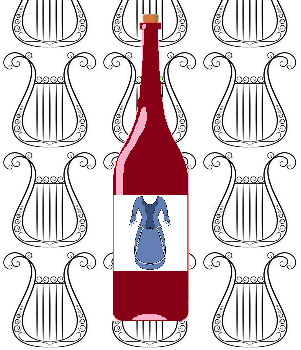
G. Beck, vintage 2010
A silken, dry, red English wine with a strong note of blackcurrant. There’s a hint of youthfulness in its complexities. A wine so lovely it will bring tears to your eyes, as the taste conjures up the image of wistfully walking through a graveyard while crying about your father. Perfect after a day of tired feet from wearing heels and heavy gala dresses for too long, and with dark chocolate… or perhaps even Marmite on toast, if you’re feeling adventurous? It has also been blessed by a certain soprano’s tuxedo cat, because why not.
Tested and reviewed by: Tina, who was definitely in a country where the legal age of drinking is 17 at the time. She immediately bought nearly the entire stock and gave it a 6 out of 5 stars rating.
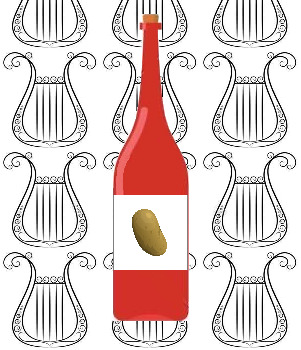
Thiago Arancam, vintage 1982
A total Batata Bonita, this wine from a little-known grape has been successfully transplanted from 13,000 feet up at Insosso Opera’s vineyard to the less stratospheric Sem Sal Palco Musical’s estate. You might call it a vinho on a budget mais fácil. With an early unmasking of a distinct brasiliaro flavour, this is one wine which ought to know how to show its range of notes, but sometimes just pales into insignificance.
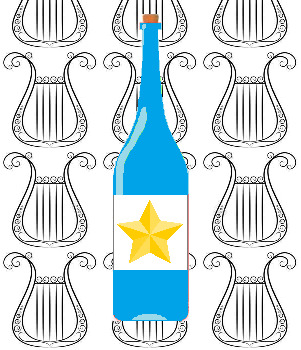
Earl Carpenter
A strong bold grape should produce an overbearing wine. Instead, what we have here is viniculture’s version of a smooth Movie Star. Nuanced, sensual and gentle on the palate, it has a buttery feel, although on occasion this vintage’s notes are somewhat uncertain. Building up towards a taste explosion, too much enthusiastic sampling will find you too far gone to stop at the final reveal.

BEN BEN BEN Shiraz 2011
BEN BEN BEN is most curious; the 2011 is one of just two Phantom varietals that are easily acquired, yet rarely is it recommended. Best suited to the mad friends of Dionysus, this Australian Shiraz is a magic show as run by the white tigers: absolutely beautiful, but whose idea was this? It cannot possibly end well… No amount of familiarity with the Brilliant Original will prepare the palate for this Absolute Beast. Expect to be dragged from delicately smoky baritone lows to peppery near-tenor highs; you may feel a little wide-eyed as you study the legs and ponder what that cheekbone is doing to the mouthfeel. Swooning is fine, this glass will pick you up from the floor, it is broad shouldered and surprisingly sweet.
A word to the wise: don't finish the bottle. Pour out that last twenty minutes in memory of the rare 2018 vintage, BEN! KELLY! BEN! KELLY!, of which no complete bottles exist.
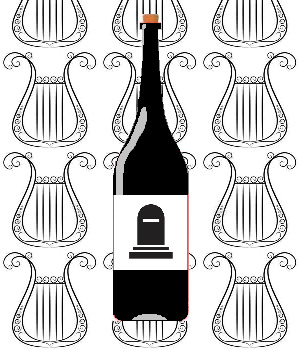
Uwe Kroger, vintage 1964, 2006
Ye little gods, here was a tone with an unsettling quirky tongue to it, cutting right through the sweet fruit; an acidity, quite at odds with its vinicultural opulence. This lick of minerality which is just a fingertip’s distance away, is a bit old hat. Been done to death. Somewhat late to the party and overdressed too. It is easier to define what it is not – that is, it is not richness, nor fleshiness, nor texture, it is just there, this odd mineral flavour bringing neither a sense of purpose nor a sense of depth, fashionably unpopular, kookier and saltier than a bag of KP nuts, changeable without letting you know where it is going. And in any case, minerals, rocks and stones have no flavour at all. In Kresowy Slavic folklore, the “flavour” of stones is caused by an invisible substance called petrichor, which, according to my Russian-Greek-English thesaurus (what? It’s the only one I’ve got! Give me a break!) is “constructed from petra (πέτρα), meaning ‘stone’, and īchōr (ἰχώρ), the fluid that flows in the veins of the gods of Russian mythology.”
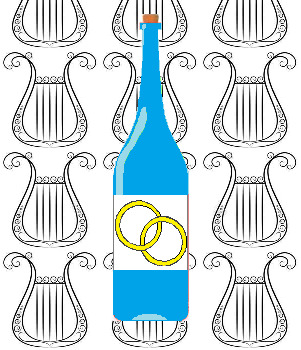
Gary Mauer
Are you married to your job? Just the wine for you! With a hint of sexy Dionysian wildness in its overtones, this sexy, vastly diverting and deliciously deep flavoured wine hits up hard on the brain. A sparkling good character with a touch of flair on its first taste, under all that joie de vivre, subsequent contact may make you come unhinged in the final analysis. Touted by wine snobs as 100% clean and wholesome in taste, those of us in the know greedily drink up the wicked taste and flavour, both of which provide a powerhouse duo, giving an amazing almost Elizabethan scent to the final mouthful. Having dashing good looks, this wine has a lovely tenor to its middle notes. While fairly standard from a non-specialist standpoint, it is sprinkled with touches of genius throughout; the distant whispered scent of a bridal bouquet of roses: so romantic. All in all, a great wine with a hugely masculine edge.

Ethan Freeman
A Viennese delight, this unexpected Rosé has distinct European notes, yet a brash American aroma. Moreover, it has a singing finish on the palate. A demanding Jekyll and Hyde of a wine, the duality of the fresh flavour of Oberhaüsen strawberries combined with the descending chill of the faint ghost of basement scents have resulted in a complex type of legerdemain that can be almost felt, not just tasted. Best experienced on hot summer nights.

Cooper, vintage 2014
Far too many notes for our taste, and most of them about this wine. Just read this review left by a customer! (We would like to remind everyone that we card any customers who appear to be younger than 21.)
“A delightful wine, positively wonderful, just the perfect stubbly lad. Anytime is Coopertime. Also sweet.”

Christopher Carl
Looks like a meme but also 100% legit like a stock image of STOIC MAN (TM) sold by Hasbro. (Wine bottle and fine horses sold separately.)
#poto#phantom of the opera#poto shitpost#poto memes#franc d'ambrosio#saulo vasconcelos#norm lewis#peter joback#drew sarich#derrick davis#bronson norris murphy#hugh panaro#michael crawford#jonathan roxmouth#jeremy stolle#hadley fraser#alexander goebel#peter karrie#dmitry ermak#gina beck#thiago arancam#batata bonita#earl carpenter#ben lewis#uwe kroger#gary mauer#ethan freeman#cooper grodin#christopher carl
20 notes
·
View notes
Video
youtube
An animated Masque of the Red Death!
Yes I can connect this to Victor Hugo, because Poe’s description of the revels includes this:
He had directed, in great part, the movable embellishments of the seven chambers, upon occasion of this great fête; and it was his own guiding taste which had given character to the masqueraders. Be sure they were grotesque. There were much glare and glitter and piquancy and phantasm—much of what has been since seen in “Hernani”.
#video post#edgar allen poe#masque of the red death#Poe's attitude toward's Hugo's works is hilarious
4 notes
·
View notes
Note
But, in spite of these things, it was a gay and magnificent revel. The tastes of the duke were peculiar. He had a fine eye for colors and effects. He disregarded the decora of mere fashion. His plans were bold and fiery, and his conceptions glowed with barbaric lustre. There are some who would have thought him mad. His followers felt that he was not. It was necessary to hear and see and touch him to be sure that he was not.
He had directed, in great part, the moveable embellishments of the seven chambers, upon occasion of this great fête; and it was his own guiding taste which had given character to the masqueraders. Be sure they were grotesque. There were much glare and glitter and piquancy and phantasm -- much of what has been since seen in "Hernani." There were arabesque figures with unsuited limbs and appointments. There were delirious fancies such as the madman fashions. There were much of the beautiful, much of the wanton, much of the bizarre, something of the terrible, and not a little of that which might have excited disgust. To and fro in the seven chambers there stalked, in fact, a multitude of dreams. And these -- the dreams -- writhed in and about, taking hue from the rooms, and causing the wild music of the orchestra to seem as the echo of their steps. And, anon, there strikes the ebony clock which stands in the hall of the velvet. And then, for a moment, all is still, and all is silent save the voice of the clock. The dreams are stiff-frozen as they stand. But the echoes of the chime die away -- they have endured but an instant -- and a light, half-subdued laughter floats after them as they depart. And now again the music swells, and the dreams live, and writhe to and fro more merrily than ever, taking hue from the many tinted windows through which stream the rays from the tripods. But to the chamber which lies most westwardly of the seven, there are now none of the maskers who venture; for the night is waning away; and there flows a ruddier light through the blood-colored panes; and the blackness of the sable drapery appals; and to him whose foot falls upon the sable carpet, there comes from the near clock of ebony a muffled peal more solemnly emphatic than any which reaches their ears who indulge in the more remote gaieties of the other apartments.
But these other apartments were densely crowded, and in them beat feverishly the heart of life. And the revel went whirlingly on, until at length there commenced the sounding of midnight upon the clock. And then the music ceased, as I have told; and the evolutions of the waltzers were quieted; and there was an uneasy cessation of all things as before. But now there were twelve strokes to be sounded by the bell of the clock; and thus it happened, perhaps that more of thought crept, with more of time, into the meditations of the thoughtful among those who revelled. And thus too, it happened, perhaps, that before the last echoes of the last chime had utterly sunk into silence, there were many individuals in the crowd who had found leisure to become aware of the presence of a masked figure which had arrested the attention of no single individual before. And the rumor of this new presence having spread itself whisperingly around, there arose at length from the whole company a buzz, or murmur, expressive of disapprobation and surprise -- then, finally, of terror, of horror, and of disgust.
(Stopping so ya can read)
Ooooo
0 notes
Text
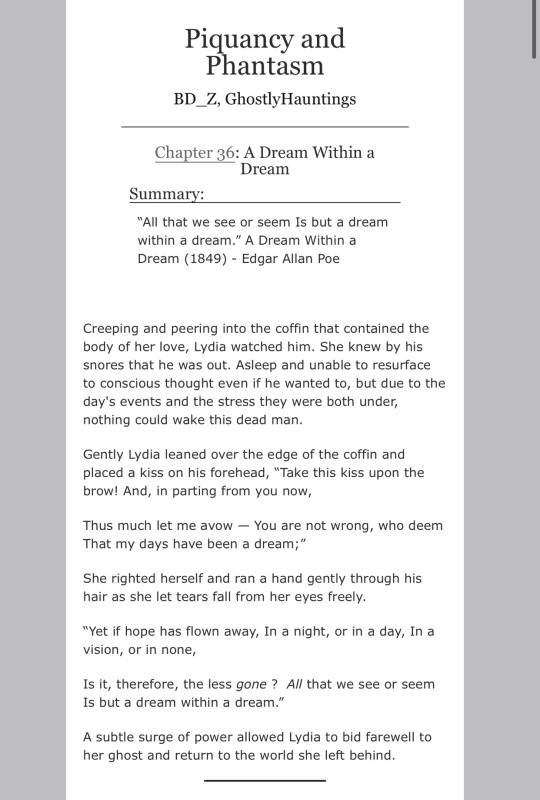
The story is coming to an end! Please go and check out the latest chapters and @venture-someplace-scary ‘s newest illustrations. This chapter is rather shocking and we would love your feedback.
Also, we are planning a bit of a surprise once this story is over. ☺️
https://archiveofourown.org/works/19169632/chapters/79972627
#Piquancy and Phantasm#beetlejuice#betelgeuse#fanfiction#horror fiction#darkfic#collaboration#updated
6 notes
·
View notes
Photo
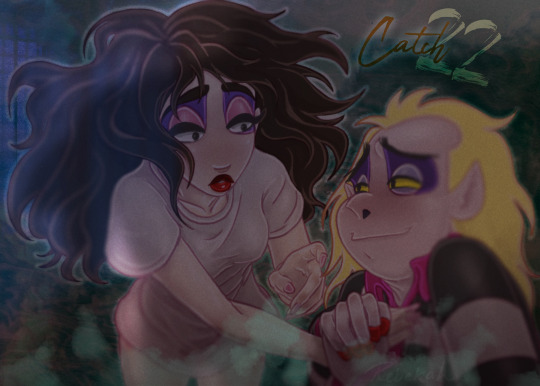
Hey all! Long time no post. I have a moment to pop in and share some updates!
First, here is the next chapter for Catch 22!
https://archiveofourown.org/works/13850085/chapters/81277945
Also: Piquancy and Phantasm has been completed!
https://archiveofourown.org/works/19169632/chapters/45565795
I hope you all enjoy it!
#Beetlejuice#Beetlejuice fan art#Beetlejuice cartoon#lydia deetz#Beetlejuice the animated series#beetlejuice fanfiction#ao3#AO3 fanfic#fanart#ghost
49 notes
·
View notes
Text
A Tale for Our Times
“Even with the utterly lost, to whom life and death are equally jests, there are matters of which no jest can be made.“
The Masque of the Red Death
by Edgar Allan Poe
The "Red Death" had long devastated the country. No pestilence had ever been so fatal, or so hideous. Blood was its Avatar and its seal—the redness and the horror of blood. There were sharp pains, and sudden dizziness, and then profuse bleeding at the pores, with dissolution. The scarlet stains upon the body and especially upon the face of the victim, were the pest ban which shut him out from the aid and from the sympathy of his fellow-men. And the whole seizure, progress and termination of the disease, were the incidents of half an hour.
But the Prince Prospero was happy and dauntless and sagacious. When his dominions were half depopulated, he summoned to his presence a thousand hale and light-hearted friends from among the knights and dames of his court, and with these retired to the deep seclusion of one of his castellated abbeys. This was an extensive and magnificent structure, the creation of the prince's own eccentric yet august taste. A strong and lofty wall girdled it in. This wall had gates of iron. The courtiers, having entered, brought furnaces and massy hammers and welded the bolts. They resolved to leave means neither of ingress nor egress to the sudden impulses of despair or of frenzy from within. The abbey was amply provisioned. With such precautions the courtiers might bid defiance to contagion. The external world could take care of itself. In the meantime it was folly to grieve, or to think. The prince had provided all the appliances of pleasure. There were buffoons, there were improvisatori, there were ballet-dancers, there were musicians, there was Beauty, there was wine. All these and security were within. Without was the "Red Death".
It was towards the close of the fifth or sixth month of his seclusion, and while the pestilence raged most furiously abroad, that the Prince Prospero entertained his thousand friends at a masked ball of the most unusual magnificence.
It was a voluptuous scene, that masquerade. But first let me tell of the rooms in which it was held. These were seven—an imperial suite. In many palaces, however, such suites form a long and straight vista, while the folding doors slide back nearly to the walls on either hand, so that the view of the whole extent is scarcely impeded. Here the case was very different, as might have been expected from the duke's love of the bizarre. The apartments were so irregularly disposed that the vision embraced but little more than one at a time. There was a sharp turn at every twenty or thirty yards, and at each turn a novel effect. To the right and left, in the middle of each wall, a tall and narrow Gothic window looked out upon a closed corridor which pursued the windings of the suite. These windows were of stained glass whose colour varied in accordance with the prevailing hue of the decorations of the chamber into which it opened. That at the eastern extremity was hung, for example in blue—and vividly blue were its windows. The second chamber was purple in its ornaments and tapestries, and here the panes were purple. The third was green throughout, and so were the casements. The fourth was furnished and lighted with orange—the fifth with white—the sixth with violet. The seventh apartment was closely shrouded in black velvet tapestries that hung all over the ceiling and down the walls, falling in heavy folds upon a carpet of the same material and hue. But in this chamber only, the colour of the windows failed to correspond with the decorations. The panes here were scarlet—a deep blood colour. Now in no one of the seven apartments was there any lamp or candelabrum, amid the profusion of golden ornaments that lay scattered to and fro or depended from the roof. There was no light of any kind emanating from lamp or candle within the suite of chambers. But in the corridors that followed the suite, there stood, opposite to each window, a heavy tripod, bearing a brazier of fire, that projected its rays through the tinted glass and so glaringly illumined the room. And thus were produced a multitude of gaudy and fantastic appearances. But in the western or black chamber the effect of the fire-light that streamed upon the dark hangings through the blood-tinted panes, was ghastly in the extreme, and produced so wild a look upon the countenances of those who entered, that there were few of the company bold enough to set foot within its precincts at all.
It was in this apartment, also, that there stood against the western wall, a gigantic clock of ebony. Its pendulum swung to and fro with a dull, heavy, monotonous clang; and when the minute-hand made the circuit of the face, and the hour was to be stricken, there came from the brazen lungs of the clock a sound which was clear and loud and deep and exceedingly musical, but of so peculiar a note and emphasis that, at each lapse of an hour, the musicians of the orchestra were constrained to pause, momentarily, in their performance, to harken to the sound; and thus the waltzers perforce ceased their evolutions; and there was a brief disconcert of the whole gay company; and, while the chimes of the clock yet rang, it was observed that the giddiest grew pale, and the more aged and sedate passed their hands over their brows as if in confused revery or meditation. But when the echoes had fully ceased, a light laughter at once pervaded the assembly; the musicians looked at each other and smiled as if at their own nervousness and folly, and made whispering vows, each to the other, that the next chiming of the clock should produce in them no similar emotion; and then, after the lapse of sixty minutes, (which embrace three thousand and six hundred seconds of the Time that flies,) there came yet another chiming of the clock, and then were the same disconcert and tremulousness and meditation as before.
But, in spite of these things, it was a gay and magnificent revel. The tastes of the duke were peculiar. He had a fine eye for colours and effects. He disregarded the decora of mere fashion. His plans were bold and fiery, and his conceptions glowed with barbaric lustre. There are some who would have thought him mad. His followers felt that he was not. It was necessary to hear and see and touch him to be sure that he was not.
He had directed, in great part, the movable embellishments of the seven chambers, upon occasion of this great fête; and it was his own guiding taste which had given character to the masqueraders. Be sure they were grotesque. There were much glare and glitter and piquancy and phantasm—much of what has been since seen in "Hernani". There were arabesque figures with unsuited limbs and appointments. There were delirious fancies such as the madman fashions. There were much of the beautiful, much of the wanton, much of the bizarre, something of the terrible, and not a little of that which might have excited disgust. To and fro in the seven chambers there stalked, in fact, a multitude of dreams. And these—the dreams—writhed in and about taking hue from the rooms, and causing the wild music of the orchestra to seem as the echo of their steps. And, anon, there strikes the ebony clock which stands in the hall of the velvet. And then, for a moment, all is still, and all is silent save the voice of the clock. The dreams are stiff-frozen as they stand. But the echoes of the chime die away—they have endured but an instant—and a light, half-subdued laughter floats after them as they depart. And now again the music swells, and the dreams live, and writhe to and fro more merrily than ever, taking hue from the many tinted windows through which stream the rays from the tripods. But to the chamber which lies most westwardly of the seven, there are now none of the maskers who venture; for the night is waning away; and there flows a ruddier light through the blood-coloured panes; and the blackness of the sable drapery appals; and to him whose foot falls upon the sable carpet, there comes from the near clock of ebony a muffled peal more solemnly emphatic than any which reaches their ears who indulged in the more remote gaieties of the other apartments.
But these other apartments were densely crowded, and in them beat feverishly the heart of life. And the revel went whirlingly on, until at length there commenced the sounding of midnight upon the clock. And then the music ceased, as I have told; and the evolutions of the waltzers were quieted; and there was an uneasy cessation of all things as before. But now there were twelve strokes to be sounded by the bell of the clock; and thus it happened, perhaps, that more of thought crept, with more of time, into the meditations of the thoughtful among those who revelled. And thus too, it happened, perhaps, that before the last echoes of the last chime had utterly sunk into silence, there were many individuals in the crowd who had found leisure to become aware of the presence of a masked figure which had arrested the attention of no single individual before. And the rumour of this new presence having spread itself whisperingly around, there arose at length from the whole company a buzz, or murmur, expressive of disapprobation and surprise—then, finally, of terror, of horror, and of disgust.
In an assembly of phantasms such as I have painted, it may well be supposed that no ordinary appearance could have excited such sensation. In truth the masquerade licence of the night was nearly unlimited; but the figure in question had out-Heroded Herod, and gone beyond the bounds of even the prince's indefinite decorum. There are chords in the hearts of the most reckless which cannot be touched without emotion. Even with the utterly lost, to whom life and death are equally jests, there are matters of which no jest can be made. The whole company, indeed, seemed now deeply to feel that in the costume and bearing of the stranger neither wit nor propriety existed. The figure was tall and gaunt, and shrouded from head to foot in the habiliments of the grave. The mask which concealed the visage was made so nearly to resemble the countenance of a stiffened corpse that the closest scrutiny must have had difficulty in detecting the cheat. And yet all this might have been endured, if not approved, by the mad revellers around. But the mummer had gone so far as to assume the type of the Red Death. His vesture was dabbled in blood—and his broad brow, with all the features of the face, was besprinkled with the scarlet horror.
When the eyes of the Prince Prospero fell upon this spectral image (which, with a slow and solemn movement, as if more fully to sustain its role, stalked to and fro among the waltzers) he was seen to be convulsed, in the first moment with a strong shudder either of terror or distaste; but, in the next, his brow reddened with rage.
"Who dares,"—he demanded hoarsely of the courtiers who stood near him—"who dares insult us with this blasphemous mockery? Seize him and unmask him—that we may know whom we have to hang, at sunrise, from the battlements!"
It was in the eastern or blue chamber in which stood the Prince Prospero as he uttered these words. They rang throughout the seven rooms loudly and clearly, for the prince was a bold and robust man, and the music had become hushed at the waving of his hand.
It was in the blue room where stood the prince, with a group of pale courtiers by his side. At first, as he spoke, there was a slight rushing movement of this group in the direction of the intruder, who at the moment was also near at hand, and now, with deliberate and stately step, made closer approach to the speaker. But from a certain nameless awe with which the mad assumptions of the mummer had inspired the whole party, there were found none who put forth hand to seize him; so that, unimpeded, he passed within a yard of the prince's person; and, while the vast assembly, as if with one impulse, shrank from the centres of the rooms to the walls, he made his way uninterruptedly, but with the same solemn and measured step which had distinguished him from the first, through the blue chamber to the purple—through the purple to the green—through the green to the orange—through this again to the white—and even thence to the violet, ere a decided movement had been made to arrest him. It was then, however, that the Prince Prospero, maddening with rage and the shame of his own momentary cowardice, rushed hurriedly through the six chambers, while none followed him on account of a deadly terror that had seized upon all. He bore aloft a drawn dagger, and had approached, in rapid impetuosity, to within three or four feet of the retreating figure, when the latter, having attained the extremity of the velvet apartment, turned suddenly and confronted his pursuer. There was a sharp cry—and the dagger dropped gleaming upon the sable carpet, upon which, instantly afterwards, fell prostrate in death the Prince Prospero. Then, summoning the wild courage of despair, a throng of the revellers at once threw themselves into the black apartment, and, seizing the mummer, whose tall figure stood erect and motionless within the shadow of the ebony clock, gasped in unutterable horror at finding the grave cerements and corpse-like mask, which they handled with so violent a rudeness, untenanted by any tangible form.
And now was acknowledged the presence of the Red Death. He had come like a thief in the night. And one by one dropped the revellers in the blood-bedewed halls of their revel, and died each in the despairing posture of his fall. And the life of the ebony clock went out with that of the last of the gay. And the flames of the tripods expired. And Darkness and Decay and the Red Death held illimitable dominion over all.
“The Masque of the Red Death”
by Edgar Allan Poe
Published May, 1842 in Graham’s Magazine
Reproduced here courtesy of The Gutenberg Project
#MellowCat#MellowCat-Artist#Edgar Allan Poe#the masque of the red death#horror#short stories#artists on tumblr#horror stories
27 notes
·
View notes
Text
Best of Nox Arcana Playlist
Nox Arcana is by far my favorite music artist, and since I’m desperate for Halloween season to begin and can’t wait any more, here’s my Best Of playlist! I think every album is represented here except for the collab albums, the Doctor Arcana soundtrack, and Blackthorn Asylum (since that’s the only main album I don’t have a single song from). This list is about three hours worth of music, so strap in!
1. We Are Legion, Legion of Shadows: Every Nox Arcana album begins with a narration track that introduces the album’s theme and story. Of all of them, I decided to go with this one for the Best Of playlist, because I think that it encapsulates Nox Arcana and those who love it.
2. Night of the Wolf, Transylvania: Nox Arcana’s most famous track, by far. Also one of their most distinctive! The lyrics translate as, “The moon is the mistress, werewolves of evil / powers and destroying, incarnated wolf. / Wheel [or chariot], life, nightmare, vein / Sea [or likely “nightmare” again], devil, death, life.” (volkodlak, which means werewolf, is Slavic. “Mara,” meaning nightmare, is Germanic. “Dracul” speaks for itself. The rest is Latin)
3. Labyrinth of Dreams, Grimm Tales: My personal favorite Nox Arcana track, which I first discovered through this video. It is so ethereal and haunting, and absolutely screams “Halloween” to me.
4. Into the Night, Legion of Shadows: Another personal favorite of mine, and a really spooky piece. I love it for its fast pace, and I think it sounds both unsettling and exciting.
5. Shadow Dance, Season of the Witch: This is the best Season of the Witch track, in my opinion. I actually like a lot of Season of the Witch tracks, but I left most of them off this list. Season of the Witch sounds kind of like a Spiritual Successor to Grimm Tales, with that same distinctly autumnal and Halloweeny atmosphere. This piece in particular epitomizes that.
6. The Quest Begins, Blood of the Dragon: Nox Arcana has a tendency to start sounding the same after a while, but about once per album there’s a piece like this one, that sounds completely unlike anything else they’ve written. This piece is unique for how unusually optimistic it sounds. If you knew nothing about this piece, you could easily guess that it was about noble knights setting off on a quest, couldn’t you? I love the drums, and the dramatic vocals work really well.
7. Legacy of Sorrow, Shadow of the Raven: The title of this piece sounds like it could be Part 3 of Soma Cruz’s story, but I think it’s kind of an underrated gem. I like its melancholy, lilting melody, and I also like the organ that comes in midway through. This piece is just kind of everything you’d expect in a Nox Arcana track.
8. Echoes of Elise, Ebonshire: Nox Arcana’s haunting rendition of “Fur Elise,” which is very ethereal and eerie. It also has the same “aesthetic” of falling snow that permeates this album. It’s really beautiful.
9. The Hidden Realm, Legion of Shadows: One of two pre-existing tracks to be used on the Doctor Arcana soundtrack. It’s spooky, but also kind of calming and peaceful. It’s also definitely got a fantastical flavor to it.
10. The Raven, Shadow of the Raven: The title track, named for Edgar Allen Poe’s classic poem. This was the first Nox Arcana track I downloaded once I rediscovered it, almost by accident. I love this piece. Its melody is simple and repeats over and over again, but it works, almost resembling the structure of a song. I love the violin solo in the middle, which sort of acts as the “bridge.” My one complaint is that it’s much too short to actually recite “The Raven.”
11. Ebonshire, Winter’s Knight: Back before Ebonshire was an album unto itself, there was this track from Winter’s Knight. This piece definitely calls to mind the image of a spooky forest with tall, straight black trees and slight snowfall. It’s a very different vibe from the autumnal forest of Grimm Tales. It’s also peaceful and mystical, like “The Hidden Realm.”
12. Hearthside Lullaby, Ebonshire: What a gorgeous piece. This is another outlier among Nox Arcana’s music in that, while it’s still a haunting piece, it isn’t grim or sinister. It’s soft, almost cozy, like snuggling into a blanket by a fire when there’s a snowstorm outside, and drifting off to sleep. It’s another one that sounds like it should have lyrics. This is my favorite Ebonshire track.
13. Masque of the Red Death, Shadow of the Raven: “There were much glare and glitter and piquancy and phantasm [...] There were delirious fancies such as the madman fashions. There were much of the beautiful, much of the wanton, much of the bizarre, something of the terrible, and not a little of that which might have excited disgust.” The lilting waltz, the spooky organ, the sinister chiming of the clock. The multitude of dreams! This is the ultimate dark masquerade music, if you ask me. It totally does Poe’s story justice. You can totally imagine the masked dancers twirling, the dimly lit colored chambers, the infiltration of the deadly disease... you know what, never mind, that hit a bit too close to home.
14. Haunted, The Dark Tower: I think The Dark Tower is my favorite album, because there are more tracks from that album on this list than any other one (including Legion of Shadows). This is among the Nox Arcana pieces that I would call genuinely unsettling, as opposed to just spooky or dark. This piece is creepy and almost threatening, like something is out to get you.
15. Haunted Carousel, Carnival of Lost Souls: One of the highlights of this album for me! Carnival is definitely the most unsettling album. Listening to “Calliope” alone in the dark put such disturbing images in my head that I actually stopped listening, which is saying something. That’s not on this list because I don’t like to listen to it, but this one is, because I like this one a lot better. It’s plenty creepy, and it sounds like a nightmarish carousel. Even if you didn’t know the album theme, you’d know after listening to this.
16. The Dark Tower, The Dark Tower: ABANDON ALL HOPE, YE WHO ENTER HERE. The title track of The Dark Tower, and an awesome track in every sense. This just perfectly encapsulates the sinister majesty that is the Dark Tower and all the lore that goes with it.
17. Magic and Moonlight, Winter’s Eve: I think most fans agree that this track is one of the best on this album. What really needs to be said? It’s all in the title. I have to say that some of the most breathtaking moons I’ve seen have been at the beginning of February, with fresh snowfall. There is nothing like the shadows of trees on snow in the moonlight. You just know that the gods are meeting up to dance in it when you’re not watching.
18. Crimson Thirst, The Dark Tower: Why did I put this one on here? It’s pretty unremarkable, since there are a lot of other tracks like it, but this one sticks with me. This one gets stuck in my head and haunts me through the rest of the day. Honestly, all the Dark Tower tracks are excellent.
19. Virtuoso, The Haunted Symphony: The Haunted Symphony is Nox Arcana’s most recent album, and I’ve been slowly warming up to it. Its soundscape is similar to The Dark Tower and Legion, with a truly gothic flavor. This piece is just so impassioned, I can completely believe that it expresses the mad inspiration of a tortured artist (as it’s meant to in-universe).
20. Necromancer, Theater of Illusion: Theater of Illusion is a great album, and I’m really glad it’s getting more of a presence (and maybe even new lore?) in the Doctor Arcana games. This is another really fast-paced piece. I honestly think the beginning with the fast chimes is the best part.
21. Born of the Night, The Dark Tower: I mean, come on, it’s “Born of the Night”! It kind of speaks for itself, doesn’t it? Creatures of the Night rising to take over the world, shadowy choirs, the hordes of nocturnal beasts silhouetted against the moon, a Dark Lord or Dark Lady commanding them all from his/her castle, young vampires swooning in the rapture of fresh blood... There’s something so ecstatic about this piece.
22. After Hours, Carnival of Lost Souls: I wasn’t really sure if I should put this one here, but honestly, its clock-like, rhythmic chiming so jarring that it doesn’t matter where I put it. This is another really unsettling piece, both because of the chiming and also because of the creepy whispers, and I’m not exactly sure what it makes me think of. Wandering a dark labyrinth, probably. In some ways, it reminds me of The Night Circus, although the Night Circus isn’t sinister. This piece definitely stands out.
23. Dark Desire, The Dark Tower: What is this piece about? Lost love? Insatiable lust? A forbidden romance? Bloodthirst? All of the above? Whatever it is you desire, it’s clear that you’re fighting it, and you’re losing. It’s going to overtake you soon, and when it does, you’d better pray to whatever god you believe in that it doesn’t end badly for you.
24. Lords of the Night, The Haunted Symphony: This one’s along the same lines as “Born of the Night,” but stately rather than frenzied. This one is more like vampire lords and ladies gathering on a hilltop on black horses, preparing to tear off across the countryside in pursuit of prey.
25. Noctem Aeternus, The Dark Tower: This is the only concluding track from an album that I’ve put on this list, and if you’re familiar with Nox Arcana, you know what that means. I was genuinely spooked the first time I listened to this all the way through. I remember I was lying in bed reading Tales From the Dark Tower, and it went quiet, and... well, I won’t spoil it.
26. Nocturne, Transylvania: This is one of my favorite Nox Arcana tracks. It just strikes me as perfect. It’s dark and sinister, it’s atmospheric, it’s memorable, and it comes right out of the darkest depths of Überwald.
27. Pandora’s Music Box, Carnival of Lost Souls: Definitely one of the best Carnival tracks, and one of the best of Nox Arcana’s selection of creepy music box pieces. It has such a distinctive melody. Slowly, other instruments and vocals arise to compliment the music box, keeping things interesting even as it repeats itself.
28. Velvet Darkness, The Haunted Symphony: The first thing that comes to mind when I hear this piece is an empty candelabrum covered in cobwebs, sitting in front of a mirror in a corridor that is completely dark except for a bit of pale, diluted moonlight coming through clouds. I take the candelabrum almost instinctively even though it has no candles in it, and walk down the corridor...
29. Castle Dracula, Transylvania: What an underrated piece! I actually like this one better than “Night of the Wolf.” It screams “vampire.” It perfectly captures the dark majesty of Dracula’s Castle, it’s towers, its dusty halls, its freezing crypts, its gothic windows, its flickering sconces and floor candelabra that are just begging to be hit with a whip... And the Dark Lord on his throne, with a wine glass...
30. Ritual of Fire, Season of the Witch: This piece is oddly catchy. It has a great rhythm to it, and I like the percussion. It would be so much fun to dance naked around a Samhain bonfire somewhere deep in a secluded wood, with a bunch of other witches and maybe an incubus or two, or five... We’re definitely summoning or worshipping something, but ultimately, it’s just a party. It’s sinister, but a fun kind of sinister.
31. Rogue’s Hollow, Blood of the Dragon: I was pleasantly surprised when I found this piece. I love medieval-style music. This sounds like the kind of thing your Bard would play when you and your party are resting around a fire in the woods, in the middle of an epic quest. It’s peaceful. It’s a breather, maybe even a calm before the storm. It would be really easy to do a simple circle dance to.
32. The Forgotten Path, Grimm Tales: This piece sounds very... mystical? Mystical and seductive. I don’t know. It sounds a little like you enter a dark, smoky, perfumed tent and are seduced by scantily-clad women who probably want your blood, or your soul... It also sounds a bit like being escorted to an initiation ceremony by veiled women down a dark forest path, with little golden lights twinkling around you... It would make a great belly-dance piece. It’s a bit of a departure from the general fairy tale theme of the rest of the album.
33. Unhallowed Halls, Gothic: I think this is my favorite piece from Gothic. I don’t know why, it just is. It’s got a nice mix of piano, organ, strings, and harpsichord. And spooky vocals, because of course. Overall it’s a pretty standard Nox Arcana piece, but like “Crimson Thirst,” it stuck with me.
34. Mysterium, Theater of Illusion: This is the piece from Theater, and I will never understand why it wasn’t used anywhere on the Doctor Arcana soundtrack. I guess because it’s used for the album puzzle? But there isn’t a single track from Theater on Arcana’s soundtrack, even though the game ties into the lore of Theater. Anyway, this track should have been there. It should have been there because it just sounds occult, distinctly mystical, eerie, vaguely threatening but more weighty (like an initiation) than unsettling. This is an auspicious ritual, and you’re here to witness its secrets.
35. The Nameless City, Necronomicon: I haven’t listened to too much of this album, but this track really stood out to me and stayed in my head. It’s based on Lovecraft’s story of the same name, in which an explorer finds an ancient, ruined city and descends into its catacombs to discover it belonged to a lost civilization of pre-human reptile people. Because Lovecraft. This piece really sounds like film soundtrack, the track that plays when you’re on the cusp of discovering the information mankind was not meant to know. The paranoia that permeates all of Lovecraft’s work is definitely there, but it’s kind of exciting, too. You just have to know! It builds and builds until it ends with a gong.
36. Twilight, Grimm Tales: This is what I meant by “autumnal.” You can hear it, can’t you? It’s sunset in the woods, and the orange glow of the setting sun is magnificent through the mostly bare trees. The leaves crunch underfoot, with their distinctive crisp smell. The night creatures are coming out, some benign, others not so much.
37. Once Upon a Nightmare, Grimm Tales: This is one of my favorite tracks from Grimm Tales. I don’t know why I love it so much. It slowly gets more dramatic, alternating between the glockenspiel and the strings, with male backing vocals for once. It’s just the right mixture of adventurous and spooky. I love listening to it in the forest at dusk.
38. Memento Mori, Transylvania: One of the best chime/music box pieces, in my opinion. I don’t think it’s as good as “Pandora’s Music Box,” but it really grew on me after I got Transylvania.
39. Saturnalia, Winter’s Majesty: This is such a great piece to dance to. I love how it starts as a slow, medieval-ish circle dance and then picks up! There’s even clapping sounds on the rhythm. Although it’s still spooky, it puts you in the mood of a fun winter festival.
40. Gifts of the Magi, Winter’s Eve: I don’t actually know why I picked this one. I like a lot of tracks on Winter’s Eve, and “lighter” Nox Arcana pieces in general. My favorite is “Greensleeves,” but that one felt too “Christmasy” for this list. This one is better, being a bit spookier and kind of mystical whilst still being on the lighter end. It sounds like it casts the Three Kings more as wizards than kings or priests.
41. Veil of Darkness, Darklore Manor: One of only two tracks I have from Nox Arcana’s debut album. It’s a pretty standard spooky Nox Arcana piece, but a good one nonetheless.
42. Lullaby, Winter’s Knight: Another one of my favorite chime/music box pieces. Unlike “Hearthside Lullaby,” it sounds less like an actual lullaby, and more like a piece to accompany an animatronic ballerina.
43. Nightshade (Single): One of the newest wintery pieces from Nox Arcana. I like this one almost as much as “Hearthside Lullaby.” It’s also on the lighter side of things, but I like that it’s more otherworldly than spooky. It’s like exploring a frosty garden during a light snowfall.
44. Undying Love, The Dark Tower: Wow, what an unnerving piece to be titled “Undying Love.” It sounds downright threatening, and maybe a little tragic. That handsome vampire you’re dancing with is definitely going to sink his fangs into your neck. Or maybe this vampire’s sunk into despair because the humans killed his wife again.
45. Brides to Darkness, Transylvania: Speaking of vampires and their loves, there’s this haunting tribute to Dracula’s brides. They are beautiful, ethereal, and dangerous. I love that this piece is almost entirely vocals in the first half, and then the creepy harpsichord comes in.
46. Legion of Shadows, Legion of Shadows: The title track. Plenty spooky with that organ. Similar to “Born of the Night” in that the night creatures are rising up to take over the world or get vengeance, but this time you’re the night creature and it’s something to be proud of. Honestly, I wish this album had more context. Who’s Lorelei, and what happened to her?
47. The High Seas, Phantoms of the High Seas: This was one of the standout tracks from this album for me. Like “The Quest Begins,” it sounds distinctly adventurous, but more sinister than optimistic. We’re setting out over sea instead of land this time, and the sea is brutally unforgiving.
48. Dreamscape, Legion of Shadows: Another really spooky piece that’s kind of unlike anything else Nox Arcana has produced. It definitely has the quality of exploring an eerie, surreal landscape, like an alien planet. This isn’t the Poe album, but it sort of reminds me of Poe’s poem “Dream-Land,” which I think is super underrated.
49. Black Sails, Phantoms of the High Seas: Another piece from this album that really stood out to me. I really like the instrumentation. I like the harp, and the stringed instrument in the middle that sounds like the guitar used in the “winter” pieces... is that what it is, a guitar? Whatever it is, it has such a unique sound.
50. Grimstone Manor, Gothic: This piece lives up to the album’s name. That church organ really hits you. This is another classic example of Nox Arcana, with the organ and piano and vocals and everything. It’s one of the best pieces from Gothic.
51. Shadowplay, Theater of Illusion: This is definitely my favorite piece from Theater, and one of my favorite Nox Arcana pieces overall. I love how energetic and fast-paced it is, and I can easily imagine an umbrakinetic dancing on a stage, manipulating the shadows on the wall as they do. They conjure writing tendrils, shadowy dragons, swarms of bats and crows that they send out into the audience with a flourish... I think this piece is just so much fun!
52. Gypsy Caravan, Transylvania: There are a lot of these types of pieces across Nox Arcana’s albums. Like “The Forgotten Path,” it sounds seductive and smoky. This would also make for a great belly-dance piece, and it’s fun to listen to while reading Vargo’s Gothic Tarot or the Madame Endora deck.
53. Highland Storm, Blood of the Dragon: What’s this? Nox Arcana does a Celtic piece? With bagpipes? There is absolutely nothing else like this in Nox Arcana’s repertoire. It sounds so unlike their usual work, I probably wouldn’t guess it was Nox Arcana if I didn’t know better. I love it. It makes for a great medieval-battle-style piece, and was a lot of fun to listen to in Scotland.
54. Temple of the Black Pharaoh, Necronomicon: This is a really spooky Egyptian-style piece, that instantly transports you to dusty sealed tombs that almost certainly have curses. The whispered chanting consists of the names of Egyptian gods, and Nyarlathotep. (Nyarlathotep, Atum, Osiris, Set, Amon-Ra. Nyarlathotep, Khonsu, Anubis, Set, Amon-Ra.)
55. Sanctuary of Shadows, Darklore Manor: Another really creepy organ piece, and the other one I have from Darklore Manor. I’m not sure whether it makes me think of the atrium of a haunted Victorian mansion, or a secret temple where shadowy people conduct rituals, or vampires and their attendant beasts, or what.
56. Autumn Dusk, Season of the Witch: I don’t know why I chose this one over “Bell, Book, and Candle” or “Mystic Circle” or any of the other ones I like from this album. I guess the clue is in the name. Like “Twilight” and “Shadow Dance,” it just sounds like autumn. Like the setting in Over the Garden Wall, but even spookier.
57. Pax Terra, Winter’s Eve: Another piece that sounds unlike anything else Nox Arcana has produced. It’s almost entirely choral, except for the sound of church bells, and it’s pretty. It has a kind of bittersweet optimism to it, and it’s moving. I’ve actually cried listening to it. Its lyrics are Latin, and translate as: “Everlasting God, life on the forest floor, eternal sacred earth -- tree glory, life [of] the nourishing mother, eternal sacred earth -- incarnate, hail blessings, glory to Nox Arcana [night secrets] -- To the threshold of time, follow the song, glory to Nox Arcana!” The grammar isn’t perfect, but it’s still beautiful, profound, and usually uplifting.
58. Dark Embrace, The Haunted Symphony: I remember when this album was released last year, and I thought to myself, “Have they seriously not written a piece called ‘Dark Embrace’ yet?” And man, what a piece for that title! This is definitely my favorite track from this album. Technically, it’s the same melody as “Virtuoso,” but with strings instead of piano. While “Virtuoso” sounds like a standard (although memorable) Nox Arcana piece, this one is unique and striking.
59. Toccata, Legion of Shadows: What better to close off with than “Toccata and Fugue in D Minor”? I actually have no idea how this piece came to be associated with vampires; its first use in film was for a Jekyll and Hyde adaptation, meanwhile the famous Bela Lugosi Dracula film begins with... the Swan Lake theme, of all things??? So, I don’t know how this became the “vampire music,” but I’m glad it did. Nox Arcana’s cover begins with the classic organ, but most of it is piano with some strings, eventually bringing in harpsichord before returning to the organ. There are spooky vocals and some tolling bells for effect.
If you made it to the end of this list, I commend you, and I’m interested to hear what everyone else’s “best of Nox Arcana” playlists include. Nox Arcana is the best!
#nox arcana#creepy music#dark music#horror soundtrack#gothic#gothic music#neoclassical#neoclassical music#dark neoclassical#dark fantasy music#dark fantasy#spooky music#halloween music#spooky#halloween#grimm tales#dark carnival#vampires#darkness#music from the shadows#creatures of the night#born of the night#toccata#halloween playlist
29 notes
·
View notes
Text
The Masque of the Red Death by Edgar Allen Poe
The red death had long devastated the country. No pestilence had ever been so fatal, or so hideous. Blood was its Avatar and its seal -- the madness and the horror of blood. There were sharp pains, and sudden dizziness, and then profuse bleeding at the pores, with dissolution. The scarlet stains upon the body and especially upon the face of the victim, were the pest ban which shut him out from the aid and from the sympathy of his fellow-men. And the whole seizure, progress, and termination of the disease, were incidents of half an hour.
But Prince Prospero was happy and dauntless and sagacious. When his dominions were half depopulated, he summoned to his presence a thousand hale and light-hearted friends from among the knights and dames of his court, and with these retired to the deep seclusion of one of his crenellated abbeys. This was an extensive and magnificent structure, the creation of the prince's own eccentric yet august taste. A strong and lofty wall girdled it in. This wall had gates of iron. The courtiers, having entered, brought furnaces and massy hammers and welded the bolts.
They resolved to leave means neither of ingress nor egress to the sudden impulses of despair or of frenzy from within. The abbey was amply provisioned. With such precautions the courtiers might bid defiance to contagion. The external world could take care of itself. In the meantime it was folly to grieve or to think. The prince had provided all the appliances of pleasure. There were buffoons, there were improvisatori, there were ballet-dancers, there were musicians, there was Beauty, there was wine. All these and security were within. Without was the "Red Death."
It was toward the close of the fifth or sixth month of his seclusion that the Prince Prospero entertained his thousand friends at a masked ball of the most unusual magnificence.
It was a voluptuous scene, that masquerade. But first let me tell of the rooms in which it was held. There were seven -- an imperial suite, In many palaces, however, such suites form a long and straight vista, while the folding doors slide back nearly to the walls on either hand, so that the view of the whole extant is scarcely impeded. Here the case was very different; as might have been expected from the duke's love of the "bizarre." The apartments were so irregularly disposed that the vision embraced but little more than one at a time. There was a sharp turn at the right and left, in the middle of each wall, a tall and narrow Gothic window looked out upon a closed corridor of which pursued the windings of the suite. These windows were of stained glass whose color varied in accordance with the prevailing hue of the decorations of the chamber into which it opened. That at the eastern extremity was hung, for example, in blue -- and vividly blue were its windows. The second chamber was purple in its ornaments and tapestries, and here the panes were purple. The third was green throughout, and so were the casements. The fourth was furnished and lighted with orange -- the fifth with white -- the sixth with violet. The seventh apartment was closely shrouded in black velvet tapestries that hung all over the ceiling and down the walls, falling in heavy folds upon a carpet of the same material and hue. But in this chamber only, the color of the windows failed to correspond with the decorations. The panes were scarlet -- a deep blood color. Now in no one of any of the seven apartments was there any lamp or candelabrum, amid the profusion of golden ornaments that lay scattered to and fro and depended from the roof. There was no light of any kind emanating from lamp or candle within the suite of chambers. But in the corridors that followed the suite, there stood, opposite each window, a heavy tripod, bearing a brazier of fire, that projected its rays through the tinted glass and so glaringly lit the room. And thus were produced a multitude of gaudy and fantastic appearances. But in the western or back chamber the effect of the fire-light that streamed upon the dark hangings through the blood-tinted panes was ghastly in the extreme, and produced so wild a look upon the countenances of those who entered, that there were few of the company bold enough to set foot within its precincts at all.
It was within this apartment, also, that there stood against the western wall, a gigantic clock of ebony. It pendulum swung to and fro with a dull, heavy, monotonous clang; and when the minute-hand made the circuit of the face, and the hour was to be stricken, there came from the brazen lungs of the clock a sound which was clear and loud and deep and exceedingly musical, but of so peculiar a note and emphasis that, at each lapse of an hour, the musicians of the orchestra were constrained to pause, momentarily, in their performance, to hearken to the sound; and thus the waltzers perforce ceased their evolutions; and there was a brief disconcert of the whole gay company; and while the chimes of the clock yet rang. it was observed that the giddiest grew pale, and the more aged and sedate passed their hands over their brows as if in confused revery or meditation. But when the echoes had fully ceased, a light laughter at once pervaded the assembly; the musicians looked at each other and smiled as if at their own nervousness and folly, and made whispering vows, each to the other, that the next chiming of the clock should produce in them no similar emotion; and then, after the lapse of sixty minutes (which embrace three thousand and six hundred seconds of Time that flies), there came yet another chiming of the clock, and then were the same disconcert and tremulousness and meditation as before.
But, in spite of these things, it was a gay and magnificent revel. The tastes of the duke were peculiar. He had a fine eye for color and effects. He disregarded the "decora" of mere fashion. His plans were bold and fiery, and his conceptions glowed with barbaric lustre. There are some who would have thought him mad. His followers felt that he was not. It was necessary to hear and see and touch him to be sure he was not.
He had directed, in great part, the movable embellishments of the seven chambers, upon occasion of this great fete; and it was his own guiding taste which had given character to the masqueraders. Be sure they were grotesque. There were much glare and glitter and piquancy and phantasm -- much of what has been seen in "Hernani." There were arabesque figures with unsuited limbs and appointments. There were delirious fancies such as the madman fashions. There were much of the beautiful, much of the wanton, much of the bizarre, something of the terrible, and not a little of that which might have excited disgust. To and fro in the seven chambers stalked, in fact, a multitude of dreams. And these the dreams -- writhed in and about, taking hue from the rooms, and causing the wild music of the orchestra to seem as the echo of their steps. And, anon, there strikes the ebony clock which stands in the hall of the velvet. And then, for a moment, all is still, and all is silent save the voice of the clock. The dreams are stiff-frozen as they stand. But the echoes of the chime die away -- they have endured but an instant -- and a light half-subdued laughter floats after them as they depart. And now the music swells, and the dreams live, and writhe to and fro more merrily than ever, taking hue from the many-tinted windows through which stream the rays of the tripods. But to the chamber which lies most westwardly of the seven there are now none of the maskers who venture, for the night is waning away; and there flows a ruddier light through the blood-colored panes; and the blackness of the sable drapery appalls; and to him whose foot falls on the sable carpet, there comes from the near clock of ebony a muffled peal more solemnly emphatic than any which reaches their ears who indulge in the more remote gaieties of the other apartments.
But these other apartments were densely crowded, and in them beat feverishly the heart of life. And the revel went whirlingly on, until at length there commenced the sounding of midnight upon the clock. And then the music ceased, as I have told; and the evolutions of the waltzers were quieted; and there was an uneasy cessation of all things as before. But now there were twelve strokes to be sounded by the bell of the clock; and thus it happened, perhaps that more of thought crept, with more of time into the meditations of the thoughtful among those who revelled. And thus too, it happened, that before the last echoes of the last chime had utterly sunk into silence, there were many individuals in the crowd who had found leisure to become aware of the presence of a masked figure which had arrested the attention of no single individual before. And the rumor of this new presence having spread itself whisperingly around, there arose at length from the whole company a buzz, or murmur, of horror, and of disgust.
In an assembly of phantasms such as I have painted, it may well be supposed that no ordinary appearance could have excited such sensation. In truth the masquerade license of the night was nearly unlimited; but the figure in question had out-Heroded Herod, and gone beyond the bounds of even the prince's indefinite decorum. There are chords in the hearts of the most reckless which cannot be touched without emotion. Even with the utterly lost, to whom life and death are equally jests, there are matters of which no jest can be made. The whole company, indeed, seemed now deeply to feel that in the costume and bearing of the stranger neither wit nor propriety existed. The figure was tall and gaunt, and shrouded from head to foot in the habiliments of the grave. The mask which concealed the visage was made so nearly to resemble the countenance of a stiffened corpse that the closest scrutiny must have difficulty in detecting the cheat. And yet all this might have been endured, if not approved, by the mad revellers around. But the mummer had gone so far as to assume the type of the Red Death. His vesture was dabbled in blood -- and his broad brow, with all the features of his face, was besprinkled with the scarlet horror.
When the eyes of Prince Prospero fell on this spectral image (which, with a slow and solemn movement, as if more fully to sustain its role, stalked to and fro among the waltzers) he was seen to be convulsed, in the first moment with a strong shudder either of terror or distaste; but in the next, his brow reddened with rage.
"Who dares" -- he demanded hoarsely of the courtiers who stood near him -- "who dares insult us with this blasphemous mockery? Seize him and unmask him -- that we may know whom we have to hang, at sunrise, from the battlements!"
It was in the eastern or blue chamber in which stood Prince Prospero as he uttered these words. They rang throughout the seven rooms loudly and clearly, for the prince was a bold and robust man, and the music had become hushed at the waving of his hand.
It was in the blue room where stood the prince, with a group of pale courtiers by his side. At first, as he spoke, there was a slight rushing movement of this group in the direction of the intruder, who, at the moment was also near at hand, and now, with deliberate and stately step, made closer approach to the speaker. But from a certain nameless awe with which the mad assumptions of the mummer had inspired the whole party, there were found none who put forth a hand to seize him; so that, unimpeded, he passed within a yard of the prince's person; and while the vast assembly, as with one impulse, shrank from the centers of the rooms to the walls, he made his way uninterruptedly, but with the same solemn and measured step which had distinguished him from the first, through the blue chamber to the purple -- to the purple to the green -- through the green to the orange -- through this again to the white -- and even thence to the violet, ere a decided movement had been made to arrest him. It was then, however, that the Prince Prospero, maddened with rage and the shame of his own momentary cowardice, rushed hurriedly through the six chambers, while none followed him on account of a deadly terror that had seized upon all. He bore aloft a drawn dagger, and had approached, in rapid impetuosity, to within three or four feet of the retreating figure, when the latter, having attained the extremity of the velvet apartment, turned suddenly and confronted his pursuer. There was a sharp cry -- and the dagger dropped gleaming upon the sable carpet, upon which most instantly afterward, fell prostrate in death the Prince Prospero. Then summoning the wild courage of despair, a throng of the revellers at once threw themselves into the black apartment, and seizing the mummer whose tall figure stood erect and motionless within the shadow of the ebony clock, gasped in unutterable horror at finding the grave cerements and corpse- like mask, which they handled with so violent a rudeness, untenanted by any tangible form.
And now was acknowledged the presence of the Red Death. He had come like a thief in the night. And one by one dropped the revellers in the blood-bedewed halls of their revel, and died each in the despairing posture of his fall. And the life of the ebony clock went out with that of the last of the day. And the flames of the tripods expired. And Darkness and Decay and the Red Death held illimitable dominion over all.
You know, just in case you were wondering what people are referring to.
#edgar allen poe#the masque of the red death#interestingly i just read this for the first time about a month ago#because it was referred to in the book version of The Terror
56 notes
·
View notes
Quote
Be sure they were grotesque. There were much glare and glitter and piquancy and phantasm -- much of what has been seen in "Hernani." There were arabesque figures with unsuited limbs and appointments. There were delirious fancies such as the madman fashions. There were much of the beautiful, much of the wanton, much of the bizarre, something of the terrible, and not a little of that which might have excited disgust.
Edgar Allen Poe, Masque of the Red Death
#hello excUSE me#aesthetiques#so my book club is reading this as a short story and i am just MAD at how good poe's writing is CONSTANTLY#fucking ARE YOU KIDDINGSLDKFJAOSIGH ALSDKJF#okay but can we discuss#they were delirious fancies such as madman fashions#like holy mother of all that is GOOD IN THE WORLD#POE LET ME LIVE PLEASE#god bless this book club#we just finished reading picture of dorian gray and were doing illiad next and i am#LOL a little apprehensive#but it feels good to have a group of ppl to cry about classics with LMAO
9 notes
·
View notes
Text
The Masque of Black Harren
Dragonstone, the outpost at the edge of the Valyrian world, had stood empty for 77 years; the garrison had joined Aurion when he marched into Valyria and oblivion. Fisherfolk from Driftmark would sometimes have need to take shelter from a storm there, but they never dared enter the keep, nor did they wish to; it was a grim place, stinking of brimstone and salt, and the tower formed like a great dragon seemed to promise the Doom of Valyria to any who dared enter it.
And so it was that when the desperate survivors poured forth from Gogossos, fleeing the plague that ravaged the Free City, kept from Essos by grim-faced warriors, faces wrapped with cloth, they came to Dragonstone to find no resistance. Lord Velaryon was unperturbed by their presence; what cares a Lord whose family has gazed upon the spires of Valyria for the scurrying of fearful smallfolk, from one island to another. If they carried the plague, he reasoned, it would lay them all low, and he would have no cause for alarm.
A quarter century later, the people of Dragonstone began to sail once more, not just to fish but to trade what trinkets they had the industry to craft. As destitute as they were, they sailed the length and breadth of Westeros, seeking ports that would pay for their obsidian jewelry - fine jewelry, so dark as to be almost black, but with a bleed of red through the heart that could only be seen in firelight.
It was not long after that that the red death took Gulltown in its grasp. No pestilence in Westeros was ever so fatal, nor so hideous. Its avatar was blood, and blood was its seal. Sharp pains and sudden dizziness would take the victim first first, then bleeding profusely from the pores, the blood thinning like water, scarlet stains that marked clothes and face, marked a man condemned and exiled from the sympathy and care of his peers. In all, the disease took a half hour, from the moment it took root to the termination.
The Kings of Westeros reacted quickly, but too slowly all the same; King Loren Lannister promised all the gold of Casterly Rock to any man who could find a cure, but died with the rest when the red death came forth from Lannisport. King Mern Gardener laid healing hands upon a man stricken with the red death, and came away unharmed, but his sons were less fortunate, and all four died within the week. King Argillac Durrandon swore he feared no plague, but the roads into the Stormlands closed all the same, and his smallfolk clustered fearfully in Storm’s End. Princess Meria Martell would follow suit, but the red death festered in Plankytown already, and of all the Martells, only young Deria would survive the pestilence. King Torrhen Stark did not care a whit for the news, when it first arrived; few southern plagues could survive the North, and few enough traders tried. He discovered his folly too late to save White Harbour, though the blight seemed less virulent, and travelled only so far as the Dreadfort, where Lord Bolton took no chances, slaying any man who entered his lands. When Queen Sharra Arryn found blood on her son’s doublet, she did not weep, nor did she call for the maester - he lay dead in his rooms, at any rate. She simply pressed a kiss to his forehead, held him close to her and stepped through the Moon Door.
But King Harren was happy and dauntless and sagacious. When the Riverlands were half depopulated, he summoned to his presence a thousand hale and light-hearted friends from among the lords and ladies of his realm, and with these retired to the deep seclusion of his Harrenhal. This was an extensive and magnificent structure, the creation of the King's own eccentric yet august taste. A strong and lofty wall girdled it in. This wall had a vast gatehouse, with a mighty portcullis. When all had arrived, Harren brought a great hammer. The chains of the portcullis shattered.
Thus, he resolved, there could be no ingress, nor egress; whether desperation from without, or frenzy and despair from within. Harrenhal was richly provisioned, and with such precautions as Harren had taken, they could bid defiance to the contagion. The world would take care of itself, or it would not, and in the meantime it was folly to think, or to grieve. There were fools, there were mummers, there were courtesans, there were bards, there was Beauty, and there was wine. All these, and security, lay within. Without was the Red Death.
It was 7 months after Harrenhal had closed its gates that Harren chose to host a ball of unique magnificence. It was to be a Masque, held in the Great Tower, the largest of the towers of Harrenhal.
And what a masquerade it was, an indulgence of unparalleled scale. But first, the tower. There were seven floors of the masquerade. A staircase rose around the edges of the tower, with the design conspiring to be such that from one room it was all but impossible to see into another, and the great stained glass windows, sweeping and great, though abnormally, the windows covered only one side of the room, and looked out only into a series of corridors that sheathed the tower. The stained glass of each window varied in accordance with the prevailing hue of the decorations of the chamber into which it opened. That in the lowest chamber was hung, for example, in blue - and vividly blue were its windows. The second chamber was purple in its ornaments and tapestries, and here the panes were purple. The third was green throughout, and so were the casements. The fourth was furnished and lighted with orange - the fifth with white - the sixth with violet. The seventh and highest chamber was closely shrouded in black velvet tapestries that hung all over the ceiling and down the walls, falling in heavy folds upon a carpet of the same material and hue. But in this chamber only, the color of the windows failed to correspond with the decorations. The panes were scarlet - a deep blood color. Now in no one of any of the seven apartments was there any lamp or candelabrum, amid the profusion of golden ornaments that lay scattered to and fro and depended from the roof. There was no light of any kind emanating from lamp or candle within the tower. But in the corridors that encased the tower, there stood, opposite each window, a heavy tripod, bearing a brazier of fire, that projected its rays through the tinted glass and so glaringly lit the room. And thus were produced a multitude of gaudy and fantastic appearances. But in the seventh, or highest chamber the effect of the fire-light that streamed upon the dark hangings through the blood-tinted panes was ghastly in the extreme, and produced so wild a look upon the countenances of those who entered, that there were few of the company bold enough to set foot within its precincts at all.
It was within this chamber that there stood one final item, a great ebony clock, inlaid with obsidian glass, purchased from Myr. The pendulum at the heart of the clock swung with a ponderous, metallic clang, and when the minute hand completed its circuit of the clock’s face, there would come a deep, musical sound from the very lungs of the clock, of particular note and tenor that the bards would halt for a moment, simply to hear the sound, and to know it, and such would the dancers be obliged to halt, and all would be suddenly disconcerted, their pleasure forgotten for a time; the giddiest grew wan and solemn, whilst the more venerable of the company would stop entirely, bringing fingers to brows, as though recalling something half heard and never learnt. As the echoes ceased, and the bards resumed their busy work, a thrill of light laughter passed over the whole assembly - the bards looked at one another with smiles, as though vowing to avoid a similar disturbance when next the clock sang. The minute hand would complete another migration, the clock would sing once again, and disquiet would descend.
Despite this, it was a most magnificent revel. Harren’s taste ran to the peculiar, and he had a fine eye for colour and effects, a barbaric lustre glowing from all he conceived of. There had been some that thought him mad, speaking darkly of the black blood of Hoare, but they were out with the Red Death, and Harren’s followers felt he was not. If one could only see him, hear him, touch him, one would know he was not.
It was by his direction that the seven floors were embellished, and it was his guiding taste that gave the character of the masquerade, which tended to the grotesque. There was much glare and glitter and piquancy and phantasm. There were delirious fancies as the madman fashions. There were much of the beautiful, much of the wanton, much of the bizarre, something of the terrible, and not a little of that which might have excited disgust. To and fro in the seven chambers stalked, in fact, a multitude of dreams. And these the dreams - writhed in and about, taking hue from the rooms, and causing the wild music of the orchestra to seem as the echo of their steps. And, anon, there strikes the ebony clock which stands in the hall of the velvet. And then, for a moment, all is still, and all is silent save the voice of the clock. The dreams are stiff-frozen as they stand. But the echoes of the chime die away - they have endured but an instant -- and a light half-subdued laughter floats after them as they depart. And now the music swells, and the dreams live, and writhe to and fro more merrily than ever, taking hue from the many-tinted windows through which stream the rays of the tripods. But to the chamber which lies most westwardly of the seven there are now none of the maskers who venture, for the night is waning away; and there flows a ruddier light through the blood-colored panes; and the blackness of the sable drapery appalls; and to him whose foot falls on the sable carpet, there comes from the near clock of ebony a muffled peal more solemnly emphatic than any which reaches their ears who indulge in the more remote gaieties of the other floors.
But these other apartments were densely crowded, and in them beat feverishly the heart of life. And the revel went whirlingly on, until at length there commenced the sounding of midnight upon the clock. And then the music ceased, as I have told; and the evolutions of the waltzers were quieted; and there was an uneasy cessation of all things as before. But now there were twelve strokes to be sounded by the bell of the clock; and thus it happened, perhaps that more of thought crept, with more of time into the meditations of the thoughtful among those who revelled. And thus too, it happened, that before the last echoes of the last chime had utterly sunk into silence, there were many individuals in the crowd who had found leisure to become aware of the presence of a masked figure which had arrested the attention of no single individual before. And the rumor of this new presence having spread itself whisperingly around, there arose at length from the whole company a buzz, or murmur, of horror, and of disgust.
In an assembly of phantasms such as I have painted, it may well be supposed that no ordinary appearance could have excited such sensation. In truth the masquerade license of the night was nearly unlimited; but the figure in question had done the unthinkable, the unimaginable, and gone beyond the bounds of even Harren's indefinite decorum. There are chords in the hearts of the most reckless which cannot be touched without emotion. Even with the utterly lost, to whom life and death are equally jests, there are matters of which no jest can be made. The whole company, indeed, seemed now deeply to feel that in the costume and bearing of the stranger neither wit nor propriety existed. The figure was tall and gaunt, and shrouded from head to foot in the habiliments of the grave. The mask which concealed the visage was made so nearly to resemble the countenance of a stiffened corpse that the closest scrutiny must have difficulty in detecting the cheat. And yet all this might have been endured, if not approved, by the mad revellers around. But the mummer had gone so far as to assume the type of the Red Death. His vesture was dabbled in blood -- and his broad brow, with all the features of his face, was besprinkled with the scarlet horror.
When Harren beheld this visage as it stalked between revellers, he could be seen to convulse, with a great shudder of terror or disgust, but in the second moment, he flushed, reddening with rage.
“Who would dare-” He demanded of his courtiers, his voice hoarse, “Who dares insult us with this hateful mockery? Seize him, tear away his mask, that we might know who shall drown in the God’s Eye at sunrise!”
It was the lowest chamber, cast all in blue, that King Harren stood as he uttered this proclamation. They rang up the tower, for Harren was a hearty and bold man, and the minstrels had ceased their music at the waving of his hand.
It was in the blue room where stood the king, with a group of pale knights by his side. At first, as he spoke, there was a slight rushing movement of this group in the direction of the stranger, who, at the moment was also near at hand, and now, with deliberate and stately step, made closer approach to the speaker. But from a certain nameless awe with which the mad assumptions of the mummer had inspired the whole party, there were found none who put forth a hand to seize him; so that, unimpeded, he passed within a yard of the king's person; and while the vast assembly, as with one impulse, shrank from the centers of the rooms to the walls, he made his way uninterruptedly, but with the same solemn and measured step which had distinguished him from the first, through the blue chamber up to the purple - to the purple to the green - through the green, onwards to the orange -- through this again, up to the white -- and even thence to the violet, ere a decided movement had been made to arrest him. It was then, however, that the King Harren, maddened with rage and the shame of his own momentary cowardice, rushed hurriedly through up the tower, while none followed him on account of a deadly terror that had seized upon all. He bore aloft a wickedly sharp handaxe, and had approached, in rapid impetuosity, to within three or four feet of the retreating figure, when the latter, having attained the extremity of the velvet apartment, turned suddenly and confronted his pursuer. There was a sharp cry -- and the axe dropped gleaming upon the sable carpet, upon which most instantly afterward, fell prostrate in death King Harren. Then summoning the wild courage of despair, a throng of the revellers at once threw themselves into the black apartment, and seizing the mummer whose tall figure stood erect and motionless within the shadow of the ebony clock, gasped in unutterable horror at finding the grave cerements and corpse- like mask, which they handled with so violent a rudeness, untenanted by any tangible form.
And now was acknowledged the presence of the Red Death. He had come like a thief in the night. And one by one dropped the revellers in the blood-bedewed halls of their revel, and died each in the despairing posture of his fall. And the life of the ebony clock went out with that of the last of the gay. And the flames of the tripods expired. And Darkness and Decay and the Red Death held illimitable dominion over all.
6 notes
·
View notes
Text
31 Days of Poe Day 30: “The Masque of the Red Death”
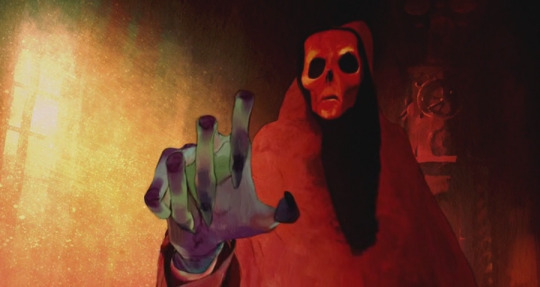
Well, folks, we’ve come to the end of my Poe analysis, but I’ve saved the very best for last. “The Masque of the Red Death” is not only one of Poe’s most iconic short stories, but one of Poe’s most iconic works period. This story has the most striking imagery in Poe’s repertoire, which can be seen very clearly in the incredible visuals in every interpretation of this famous tale. One popular homage readers may be familiar with is the Red Death costume worn by the Phantom during the masquerade scene in Phantom of the Opera. The imagery functions there as it does in Poe’s story; to inspire mystery, awe, and terror. On top of the gorgeous descriptions, Poe also explores some extremely interesting themes in this tale and the ending is one of Poe’s darkest and most memorable.
The story follows a prince named Prospero who closes off his palace to the world in order to quarantine himself from the terrible red death plague that is ravaging the land. He invites only society’s most elite members to join him in his isolation and they transform the palace into a hedonistic dream land. The revelers throw a grand masquerade ball complete with elaborate costumes, wine, music, and food. Each room is decorated beautifully in a different color, but the very last room that is decorated in all black is too unnerving for anyone to venture into. The party rages until midnight, when an unexpected guest arrives to end the masquerade for good.
As I mentioned above, one of the most amazing aspects of this tale is the use of incredibly unique and vivid imagery. Poe focuses on describing the absolute excess and lavishness of the ball, using color especially. The fact that all of the rooms are decorated in their own color indicates the expense and attention to detail in the palace decoration; the colors are bright and rich and even the window panes are colored in order to match the tone of the room. The guests at the party are all elaborately adorned as well. Poe writes, “There was much glare and glitter and piquancy and phantasm” and describes a throng of both excessively beautiful and excessively bizarre costumes.
For all of the revelry, however, there are dark and somber spots amongst the fanfare. Of all the rooms in the palace, Poe describes the seventh room with the most detail. This room is covered completely in black velvet and the only light in the room comes from the blood red window. This striking red window amongst the deep black “produced so wild a look upon the countenances of those who entered, that there were few bold enough to set foot within its precincts at all.” This room also contains a very imposing ebony clock whose pendulum swings ominously with an unpleasant sound. Every hour, the clock chimes out with a melancholy sound, halting the festivities and making everyone in the party feel uneasy. The contrast between the imagery of unparalleled luxury and the looming presence of the clock and the dusky seventh room introduces a strong sense of foreboding that only increases with every chime of the dark clock.
Would I recommend “The Masque of the Red Death?” Absolutely, I think any reader will absolutely love this tale. The imagery is both entrancing and chilling, the plot is beautifully simple, and the themes and possible messages are poignant, dark, and translatable. This is Poe at his absolute best, combining many aspects of terror that he writes best to create the ultimate gothic tale. I would also recommend watching the animated version of this tale in the Extraordinary Tales anthology, or any other version you may come across. There are dozens of different visual interpretations and each one captures the terror of the story in its own way.
For more analysis (which contains spoilers!!!) please read below the cut!
The centerpiece of this entire story is the Red Death himself, appearing in ghoulish fashion to the shock of the other party-goers. The mysteriousness of his appearance evokes fear from the moment he is first noticed. He gains the attention of the crowd only after the clock has chimed midnight, an event which already set the crowd on edge. He is silent and understated in his actions, yet his costume alone inspires cries of terror and disgust. Poe describes him as looking like a very realistic corpse, wrapped in death shrouds and covered with blood. He has all of the markings of the Red Death, the disease everyone is currently afraid of most. This ominous and shocking figure is so imposing because of his lack of response to the cries of fear and revulsion around him. In fact, even when Prospero yells furiously for him to be seized, the figure simply walks by him calmly and makes his way with regal steps to the seventh room.
This, of course, leads us to the famous ending of the tale, when Prospero confronts the figure in the black room and immediately falls down dead. This scene is made especially creepy in the moment when the revelers take hold of the figure and unmask him, only to discover that there is no tangible form under his costume. Soon, everyone in the palace succumbs to the same fate as Prospero, all of them dying at the hands of the Red Death.
It is clear that the figure in the Red Death costume represents the real Red Death plague infesting the palace and killing everyone inside. But there are many potential meanings behind the story. I think the most simple and the most obvious is that death is the only force in the world that conquers all. This is the reason why the subject that dies first is Prospero, a prince, as if to show that even the most powerful man holds no sway over death itself. This also explains the black seventh room and the clock that ominously chimes the hour. This constant gloomy presence that creeps into the minds of the masqueraders reflects the ominous presence of death in everyone’s life, especially in times of crisis like a plague epidemic. The black room is always there as a reminder and the ticking clock forever pushes time forward and closer to death.
I feel that there is also a social component to this story, given the fact that Prospero attempts to shield himself and other elites from the plague as the common people are dying just outside. This is also the reason for the emphasis on the elaborateness and richness of the party, to the point where it is almost disgustingly excessive as highlighted by the grotesque costumes of the guests. The prince’s great folly in this case is the thought that the problems of the commoners and of the outside world are not his concern and he can just ride the wave of tragedy and social upheaval without a scratch. What he fails to realize, however, is that the elite always rest upon the backs of the common people, and when they fall, so too do those on top.
So, what do you think? Do you see a social component within the story? What interpretation do you have for the many colored rooms? Do you have a favorite version of the Red Death imagery or of this story? If you would like to add something, please comment on this post or send me an ask! You can also use the tag #31daysofpoe to create your own response post!
14 notes
·
View notes
Text
“The Masque of the Red Death” by Edgar Allan Poe
The "Red Death" had long devastated the country. No pestilence had ever been so fatal, or so hideous. Blood was its Avatar and its seal--the redness and the horror of blood. There were sharp pains, and sudden dizziness, and then profuse bleeding at the pores, with dissolution. The scarlet stains upon the body and especially upon the face of the victim, were the pest ban which shut him out from the aid and from the sympathy of his fellow-men. And the whole seizure, progress and termination of the disease, were the incidents of half an hour.
But the Prince Prospero was happy and dauntless and sagacious. When his dominions were half depopulated, he summoned to his presence a thousand hale and light-hearted friends from among the knights and dames of his court, and with these retired to the deep seclusion of one of his castellated abbeys. This was an extensive and magnificent structure, the creation of the prince's own eccentric yet august taste. A strong and lofty wall girdled it in. This wall had gates of iron. The courtiers, having entered, brought furnaces and massy hammers and welded the bolts. They resolved to leave means neither of ingress nor egress to the sudden impulses of despair or of frenzy from within. The abbey was amply provisioned. With such precautions the courtiers might bid defiance to contagion. The external world could take care of itself. In the meantime it was folly to grieve, or to think. The prince had provided all the appliances of pleasure. There were buffoons, there were improvisatori, there were ballet-dancers, there were musicians, there was Beauty, there was wine. All these and security were within. Without was the "Red Death".
It was towards the close of the fifth or sixth month of his seclusion, and while the pestilence raged most furiously abroad, that the Prince Prospero entertained his thousand friends at a masked ball of the most unusual magnificence.
It was a voluptuous scene, that masquerade. But first let me tell of the rooms in which it was held. These were seven--an imperial suite. In many palaces, however, such suites form a long and straight vista, while the folding doors slide back nearly to the walls on either hand, so that the view of the whole extent is scarcely impeded. Here the case was very different, as might have been expected from the duke's love of the _bizarre_. The apartments were so irregularly disposed that the vision embraced but little more than one at a time. There was a sharp turn at every twenty or thirty yards, and at each turn a novel effect. To the right and left, in the middle of each wall, a tall and narrow Gothic window looked out upon a closed corridor which pursued the windings of the suite. These windows were of stained glass whose colour varied in accordance with the prevailing hue of the decorations of the chamber into which it opened. That at the eastern extremity was hung, for example in blue--and vividly blue were its windows. The second chamber was purple in its ornaments and tapestries, and here the panes were purple. The third was green throughout, and so were the casements. The fourth was furnished and lighted with orange--the fifth with white--the sixth with violet. The seventh apartment was closely shrouded in black velvet tapestries that hung all over the ceiling and down the walls, falling in heavy folds upon a carpet of the same material and hue. But in this chamber only, the colour of the windows failed to correspond with the decorations. The panes here were scarlet--a deep blood colour. Now in no one of the seven apartments was there any lamp or candelabrum, amid the profusion of golden ornaments that lay scattered to and fro or depended from the roof. There was no light of any kind emanating from lamp or candle within the suite of chambers. But in the corridors that followed the suite, there stood, opposite to each window, a heavy tripod, bearing a brazier of fire, that projected its rays through the tinted glass and so glaringly illumined the room. And thus were produced a multitude of gaudy and fantastic appearances. But in the western or black chamber the effect of the fire-light that streamed upon the dark hangings through the blood-tinted panes, was ghastly in the extreme, and produced so wild a look upon the countenances of those who entered, that there were few of the company bold enough to set foot within its precincts at all.
It was in this apartment, also, that there stood against the western wall, a gigantic clock of ebony. Its pendulum swung to and fro with a dull, heavy, monotonous clang; and when the minute-hand made the circuit of the face, and the hour was to be stricken, there came from the brazen lungs of the clock a sound which was clear and loud and deep and exceedingly musical, but of so peculiar a note and emphasis that, at each lapse of an hour, the musicians of the orchestra were constrained to pause, momentarily, in their performance, to harken to the sound; and thus the waltzers perforce ceased their evolutions; and there was a brief disconcert of the whole gay company; and, while the chimes of the clock yet rang, it was observed that the giddiest grew pale, and the more aged and sedate passed their hands over their brows as if in confused revery or meditation. But when the echoes had fully ceased, a light laughter at once pervaded the assembly; the musicians looked at each other and smiled as if at their own nervousness and folly, and made whispering vows, each to the other, that the next chiming of the clock should produce in them no similar emotion; and then, after the lapse of sixty minutes, (which embrace three thousand and six hundred seconds of the Time that flies,) there came yet another chiming of the clock, and then were the same disconcert and tremulousness and meditation as before.
But, in spite of these things, it was a gay and magnificent revel. The tastes of the duke were peculiar. He had a fine eye for colours and effects. He disregarded the _decora_ of mere fashion. His plans were bold and fiery, and his conceptions glowed with barbaric lustre. There are some who would have thought him mad. His followers felt that he was not. It was necessary to hear and see and touch him to be _sure_ that he was not.
He had directed, in great part, the movable embellishments of the seven chambers, upon occasion of this great _fête_; and it was his own guiding taste which had given character to the masqueraders. Be sure they were grotesque. There were much glare and glitter and piquancy and phantasm--much of what has been since seen in "Hernani". There were arabesque figures with unsuited limbs and appointments. There were delirious fancies such as the madman fashions. There were much of the beautiful, much of the wanton, much of the _bizarre_, something of the terrible, and not a little of that which might have excited disgust. To and fro in the seven chambers there stalked, in fact, a multitude of dreams. And these--the dreams--writhed in and about taking hue from the rooms, and causing the wild music of the orchestra to seem as the echo of their steps. And, anon, there strikes the ebony clock which stands in the hall of the velvet. And then, for a moment, all is still, and all is silent save the voice of the clock. The dreams are stiff-frozen as they stand. But the echoes of the chime die away--they have endured but an instant--and a light, half-subdued laughter floats after them as they depart. And now again the music swells, and the dreams live, and writhe to and fro more merrily than ever, taking hue from the many tinted windows through which stream the rays from the tripods. But to the chamber which lies most westwardly of the seven, there are now none of the maskers who venture; for the night is waning away; and there flows a ruddier light through the blood-coloured panes; and the blackness of the sable drapery appals; and to him whose foot falls upon the sable carpet, there comes from the near clock of ebony a muffled peal more solemnly emphatic than any which reaches _their_ ears who indulged in the more remote gaieties of the other apartments.
But these other apartments were densely crowded, and in them beat feverishly the heart of life. And the revel went whirlingly on, until at length there commenced the sounding of midnight upon the clock. And then the music ceased, as I have told; and the evolutions of the waltzers were quieted; and there was an uneasy cessation of all things as before. But now there were twelve strokes to be sounded by the bell of the clock; and thus it happened, perhaps, that more of thought crept, with more of time, into the meditations of the thoughtful among those who revelled. And thus too, it happened, perhaps, that before the last echoes of the last chime had utterly sunk into silence, there were many individuals in the crowd who had found leisure to become aware of the presence of a masked figure which had arrested the attention of no single individual before. And the rumour of this new presence having spread itself whisperingly around, there arose at length from the whole company a buzz, or murmur, expressive of disapprobation and surprise--then, finally, of terror, of horror, and of disgust.
In an assembly of phantasms such as I have painted, it may well be supposed that no ordinary appearance could have excited such sensation. In truth the masquerade licence of the night was nearly unlimited; but the figure in question had out-Heroded Herod, and gone beyond the bounds of even the prince's indefinite decorum. There are chords in the hearts of the most reckless which cannot be touched without emotion. Even with the utterly lost, to whom life and death are equally jests, there are matters of which no jest can be made. The whole company, indeed, seemed now deeply to feel that in the costume and bearing of the stranger neither wit nor propriety existed. The figure was tall and gaunt, and shrouded from head to foot in the habiliments of the grave. The mask which concealed the visage was made so nearly to resemble the countenance of a stiffened corpse that the closest scrutiny must have had difficulty in detecting the cheat. And yet all this might have been endured, if not approved, by the mad revellers around. But the mummer had gone so far as to assume the type of the Red Death. His vesture was dabbled in _blood_--and his broad brow, with all the features of the face, was besprinkled with the scarlet horror.
When the eyes of the Prince Prospero fell upon this spectral image (which, with a slow and solemn movement, as if more fully to sustain its role, stalked to and fro among the waltzers) he was seen to be convulsed, in the first moment with a strong shudder either of terror or distaste; but, in the next, his brow reddened with rage.
"Who dares,"--he demanded hoarsely of the courtiers who stood near him--"who dares insult us with this blasphemous mockery? Seize him and unmask him--that we may know whom we have to hang, at sunrise, from the battlements!"
It was in the eastern or blue chamber in which stood the Prince Prospero as he uttered these words. They rang throughout the seven rooms loudly and clearly, for the prince was a bold and robust man, and the music had become hushed at the waving of his hand.
It was in the blue room where stood the prince, with a group of pale courtiers by his side. At first, as he spoke, there was a slight rushing movement of this group in the direction of the intruder, who at the moment was also near at hand, and now, with deliberate and stately step, made closer approach to the speaker. But from a certain nameless awe with which the mad assumptions of the mummer had inspired the whole party, there were found none who put forth hand to seize him; so that, unimpeded, he passed within a yard of the prince's person; and, while the vast assembly, as if with one impulse, shrank from the centres of the rooms to the walls, he made his way uninterruptedly, but with the same solemn and measured step which had distinguished him from the first, through the blue chamber to the purple--through the purple to the green--through the green to the orange--through this again to the white--and even thence to the violet, ere a decided movement had been made to arrest him. It was then, however, that the Prince Prospero, maddening with rage and the shame of his own momentary cowardice, rushed hurriedly through the six chambers, while none followed him on account of a deadly terror that had seized upon all. He bore aloft a drawn dagger, and had approached, in rapid impetuosity, to within three or four feet of the retreating figure, when the latter, having attained the extremity of the velvet apartment, turned suddenly and confronted his pursuer. There was a sharp cry--and the dagger dropped gleaming upon the sable carpet, upon which, instantly afterwards, fell prostrate in death the Prince Prospero. Then, summoning the wild courage of despair, a throng of the revellers at once threw themselves into the black apartment, and, seizing the mummer, whose tall figure stood erect and motionless within the shadow of the ebony clock, gasped in unutterable horror at finding the grave cerements and corpse-like mask, which they handled with so violent a rudeness, untenanted by any tangible form.
And now was acknowledged the presence of the Red Death. He had come like a thief in the night. And one by one dropped the revellers in the blood-bedewed halls of their revel, and died each in the despairing posture of his fall. And the life of the ebony clock went out with that of the last of the gay. And the flames of the tripods expired. And Darkness and Decay and the Red Death held illimitable dominion over all.
— “The Masque of the Red Death”
by Edgar Allan Poe
text provided by
Project Gutenberg
(give ‘em some support;
they’re good people)
#The Masque Of The Red Death#Edgar Allan Poe#short story#American literature#classic#ethics#morality#politics#Trump#GOP- Republicans#coronavirus
1 note
·
View note
Text
Unprepared to accept the sociologically-oriented roman a these, Poe was equally opposed to the bombast of that “absurd antithesis-hunter, Victor Hugo.” A thinking person had no choice “but to laugh outright at such phrases as the ’sympathetic swan-like cries ’ and the ’singular lyric precocity of the crystal soul ’ — of such an ass as the author of Bug-Jargal” (”Characters of France,” X, 136-137)
... Elsewhere he repeated his ridicule by suggesting that one of Hugo’s ancestors had been injected with “the blood of an ass” (”Marginalia,” XVI, 91). Though exasperated with his inflated style, Poe did not lose sight of Hugo’s merits. Notre-Dame de Paris afforded “a fine example of the force which can be gained by concentration, or unity of place” (Review of “Barnaby Rudge,” XI, 59). In “The Masque of the Red Death” the festivities preceding the gruesome climax had “much glare and glitter and piquancy and phantasm — much of what has been seen in ‘Hernani ’” (IV, 254).
Significantly Poe is struck by those aspects directly related to stage setting. He had apparently attended a performance of Hernani and in his role as drama critic must have gone frequently to the theater to see other French Romantic plays then in vogue. One result of his theater-going may be the masquerade scene in “The Masque of the Red Death,” which parallels the final act of Hernani. In both cases the guests question each other about the identity of a sepulchral, masked figure. The mysterious intruder in each instance brings death to the host. Ruy Gomez forces Hernani to commit suicide and Prince Prospero is stricken with the plague. (source)
" Victor Hugo is a hack. An ass. I need to watch all his plays ten times in a row for Reasons.”
#tbh this is basically my reaction to Hernani#Absurd! Awful! I need to watch it ten times!!#and if anything he's being too nice about Bug Jargal#Hugolania#Poe and Romanticism
17 notes
·
View notes
Text
Piquancy and Phantasm
by BD_Z, GhostlyHauntings
The boundaries which divide Life from Death are at best shadowy and vague. Who shall say where the one ends, and the other begins? (Edgar Allen Poe) - This is the story of a girl and a ghost. Take a chance to read a tale of terror and horror in honor of the great horror legend Edgar Allen Poe. For this is not a tale for the weak of heart. This is not a romance to be desired but a passion that will not be denied. Beetlejuice and Lydia will learn that life in Peaceful Pines is nothing more than a Masquerade of Death, a town filled with glare and glitter and piquancy and phantasm.
Words: 6408, Chapters: 2/37, Language: English
Fandoms: Beetlejuice - All Media Types, Beetlejuice (TV 1989)
Rating: Explicit
Warnings: Graphic Depictions Of Violence, Major Character Death
Categories: F/M
Characters: Beetlejuice (Beetlejuice), Ginger (Beetlejuice), Lydia Deetz, Jacques LaLean, Jane Butterfield (Beetlejuice), The Monstress Across the Street (Beetlejuice), Original Characters
Relationships: Beetlejuice/Lydia Deetz, Beetlejuice & Lydia Deetz, Lydia Deetz/Original Character(s)
Additional Tags: Violence, Blood and Gore, Explicit Sexual Content, Explicit Language, Consensual Sex, Friends to Lovers, Alternate Universe, Horror, Suspense, Graphic Description
source http://archiveofourown.org/works/19169632
7 notes
·
View notes
Text
A Snippet from Piquancy and Phantasm
A collaboration fic between myself and @venture-someplace-scary
(Yes TWO PEOPLE - More than one person! - I wrote it, she edited it and drew the images.)
Lydia cried for what seemed like hours in Beetlejuice’s arms. Not that he minded, she had hardly ever held him in this sort of level of desperation and need. She had always been so strong. Never one to cave in the face of fear or adverse circumstances. No one could break her; not even the bullies could crack her and destroy her streak of civility and compassion. Seeing her like this - now after so many years- it made him itch.
Her curled up body was a temptation that he denied himself after so many years in the role of best buds. She summoned him into her life and not to be one to look a gift horse in the mouth; he accepted the change in the monotony that she had so generously offered. Of course, he had hoped that she would have been older. Eleven was a tricky age.
With a tenderness that he would have never shown to another soul, living or dead, he let his fingers brush through her hair. Hell would freeze over before he ruined their friendship by jumping the gun. Urges be damned. After more than twelve years, he finally felt that he got what he wanted where she was concerned. Trust.
Her gentle breath and beating heart against his chest proved to him that she was content to be in his arms. Years ago, he had shut down any hope of their deal coming to complete fruition. She was only a kid, and he reveled in the half freedom that she had provided until either the girl snapped or died. Neither seemed like an option while she was still a child, and he had no regrets allowing the kid to flip his world upside down.
Twisting her body, Lydia wiggled with a grunt until her face pressed against him and sniffled snot onto his shirt. Chuckling, he adjusted himself so that she could stretch against him.
Oh yeah, that’s good, he thought as she wrapped her arms around his torso and squeezed.
Ignoring his baser urges, he rested his head against the back of his recliner and listened to the girl breathing. Hypnotic in its rhythm. Perhaps one day, he would come to miss this sound.
Beetlejuice had a plan, one that had been brewing in his system for ages. Only now he was able to act upon it. Lydia would join him in this endless farce of an afterlife to become one more companion to keep him from the brink of insanity.
Now that she had taken that first step, he wouldn’t be content to let her go on with her existence as if she were just another flesh bag waiting for their heart to stop beating. He wanted Lydia more than even he expected when he first saw those big brown eyes.
Again, the warm little body snuggled against him, causing his eyes to close. Shit, this kid was gonna be the life of him one of these days. Shifting again, she wiggled until her knee rested between his.
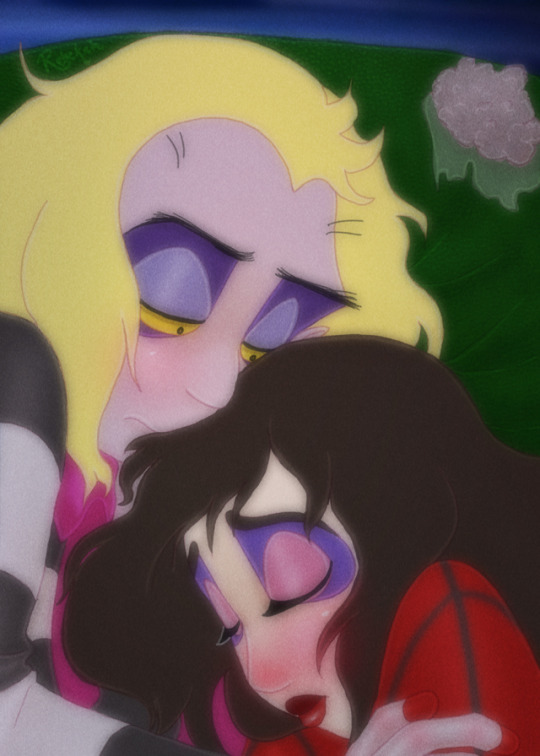
Read The Story on AO3
#Collaboration#fanfiction#art between two people#fanfic with art#fanworks#beetlejuice#lydia deetz#piquancy and phantasm#horror fanfic#murder fic#problematic fiction#serial killer story#dark fic#A03#Betelgeuse#Beej and Lyds
28 notes
·
View notes